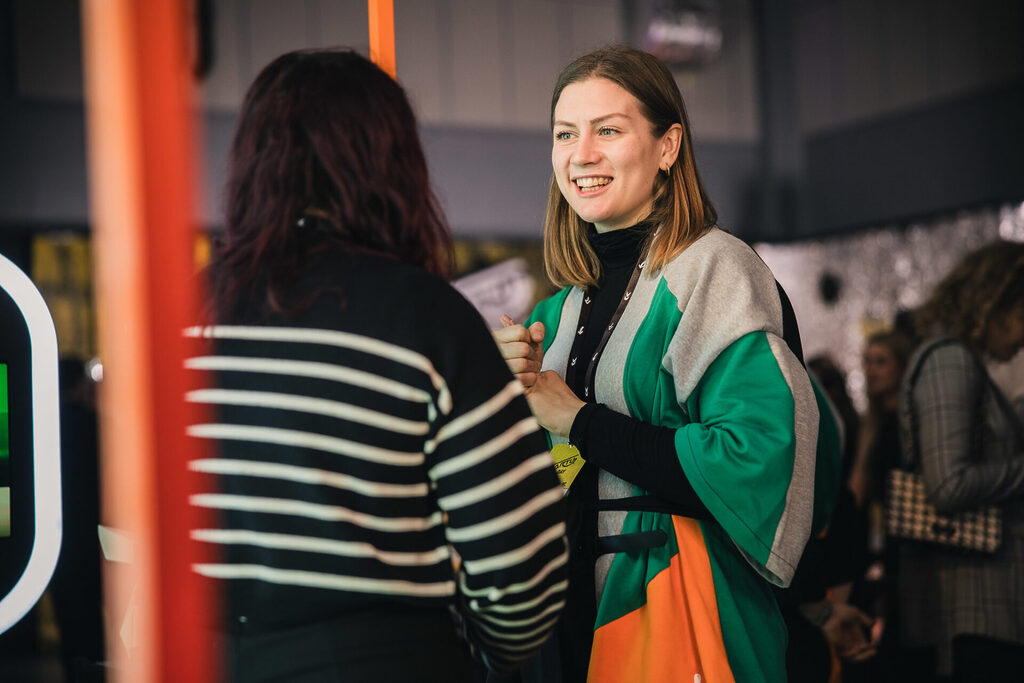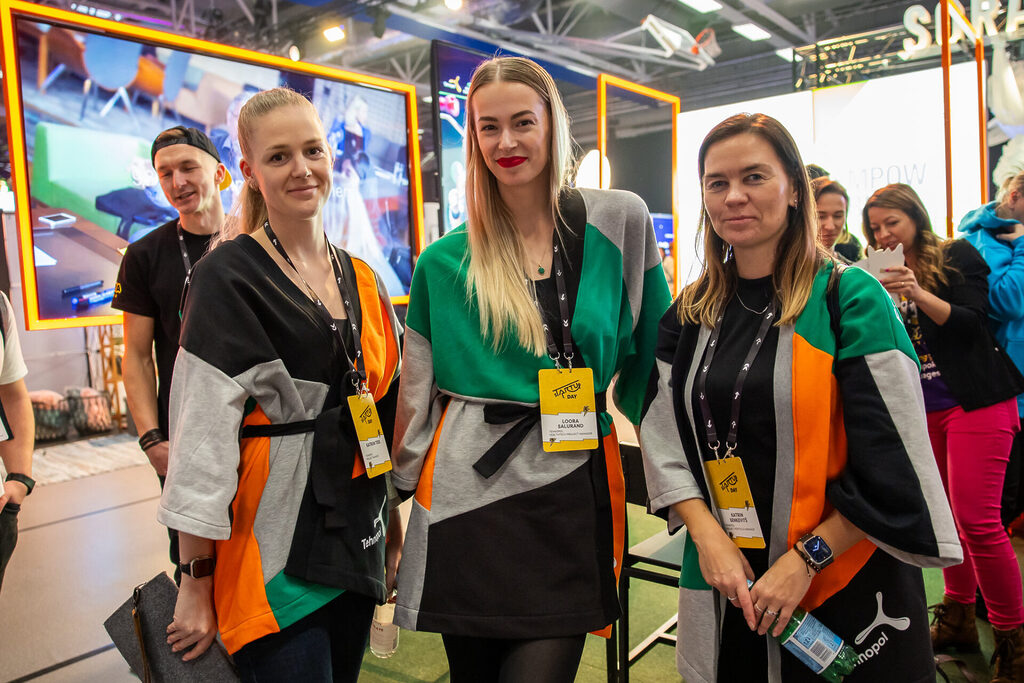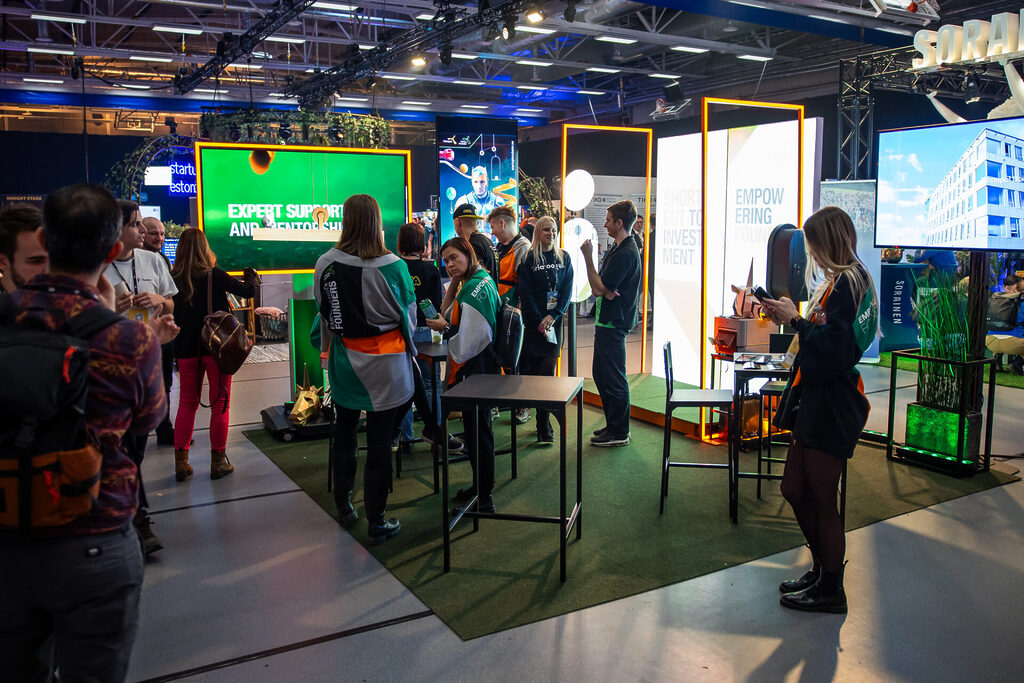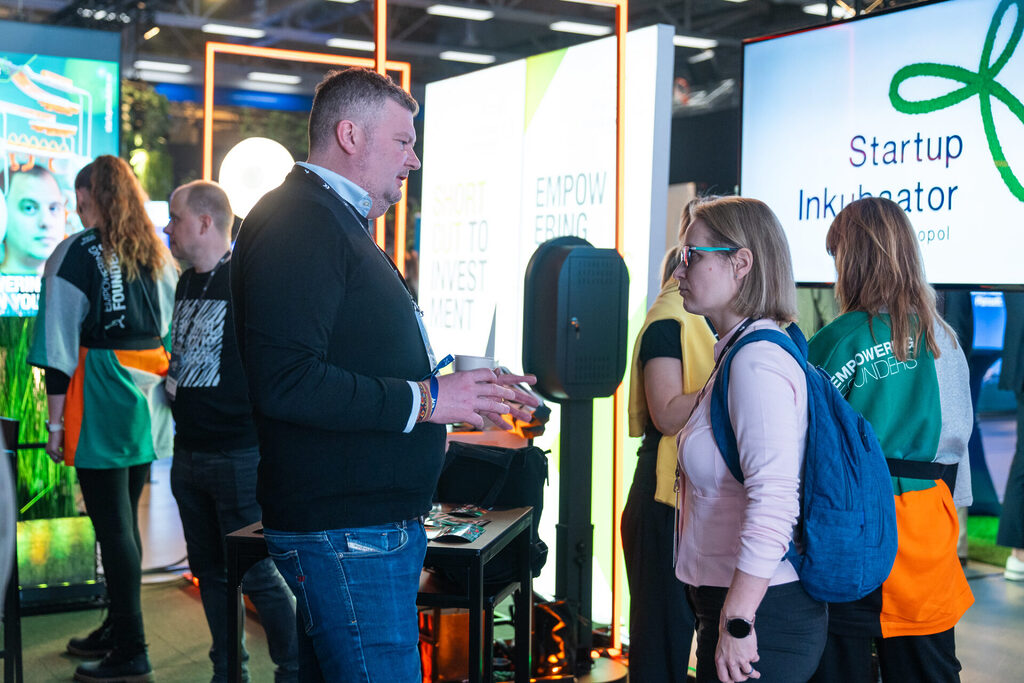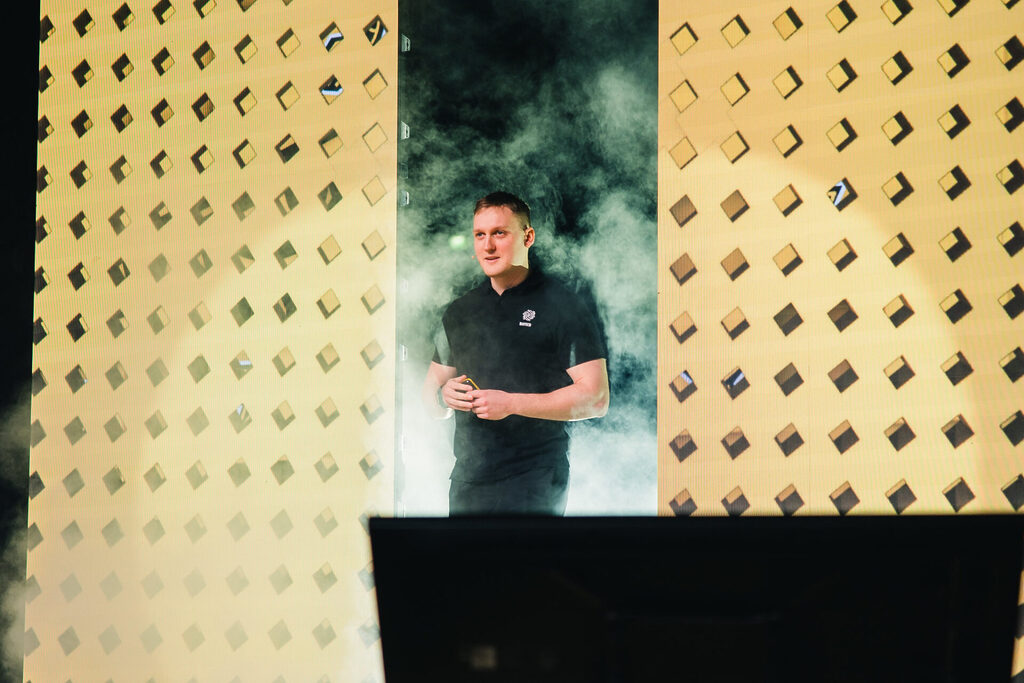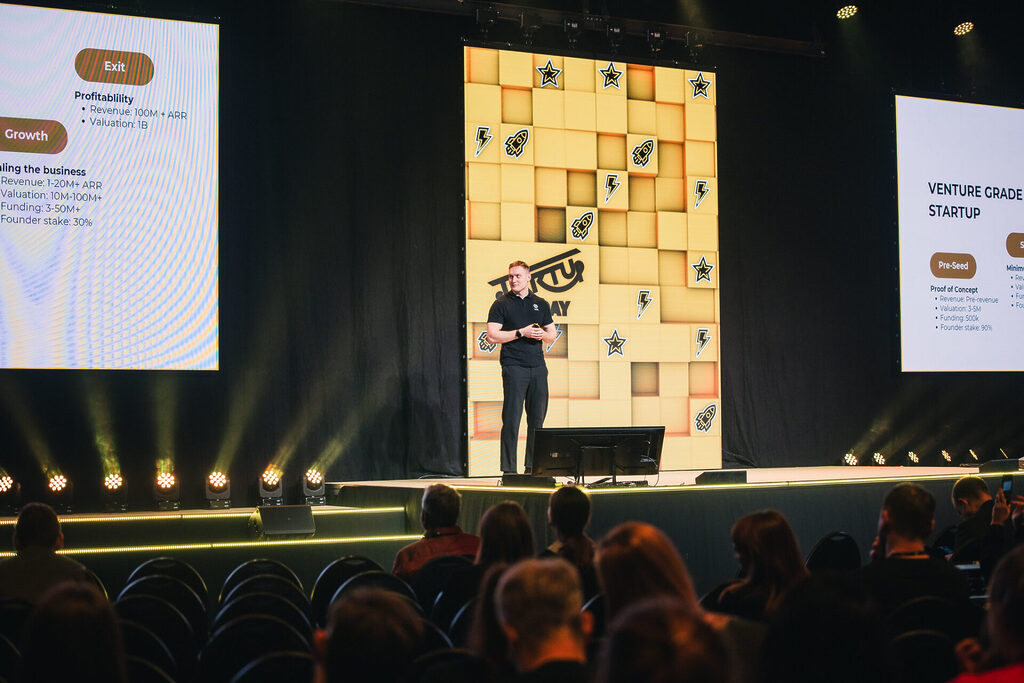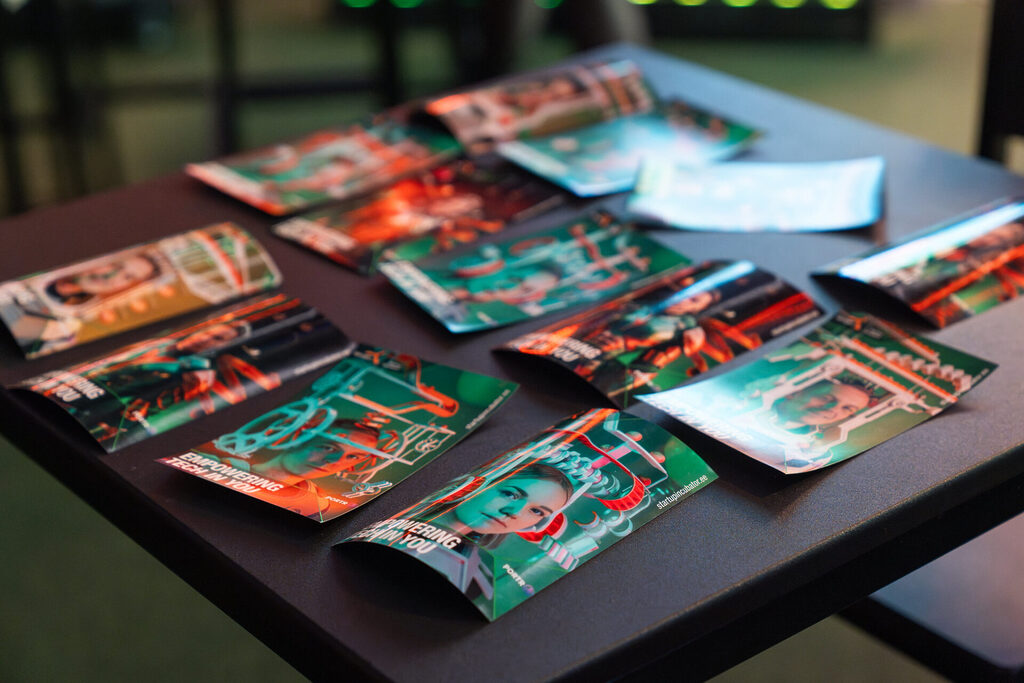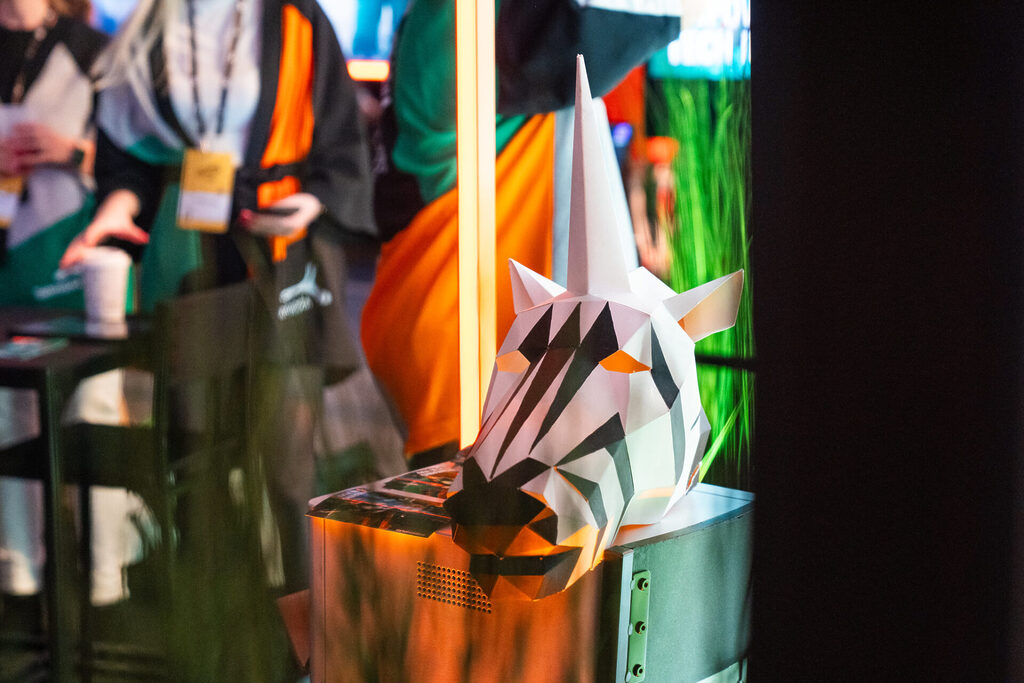Startup Story: Telearmy x NATO DIANA Estonian Accelerator
Telearmy develops teledriving technology that enables existing vehicles to be quickly and cost-effectively converted into remotely controlled ones, increasing operational flexibility and tactical efficiency.
The minds behind the startup are Enn Laansoo, Jr. and Priit Haljak. Priit, a seasoned technology lead with an engineering background, has guided the development of a road-legal teledriven vehicle from scratch. With hands-on experience leading engineering teams and delivering complex technical systems—including those tested in combat—he brings deep tech capability to the table. Enn, on the other hand, focuses on the business side of innovation. With a track record in launching an electric car-sharing company and developing a deep-tech-friendly industrial park, he’s driven by the challenge of turning advanced technology into scalable, real-world solutions. Together, they’ve built a system that combines technical excellence with market-ready agility, unlocking the full potential of teledriving.
1. How did you come up with the idea to create a startup?
We saw how teledriving technology improves vehicle efficiency, enabling optimized resource use and faster, safer operations. The same principles apply to military logistics and critical infrastructure management—remote operation minimizes losses, maximizes operational speed, and enables strategic control even in complex and high-risk environments.
2. What have been the biggest challenges/failures and the biggest wins so far?
The biggest challenge has been adapting the technology to combat conditions, including ensuring interference-resistant communications, rapid integration into various vehicle platforms, and operational reliability in hostile environments. Our biggest success is that our technology has already been tested in combat and has proven effective in Ukraine. This has given us real-world experience on how remotely controlled systems can help carry out dangerous tasks.
3. What sets your startup apart from competitors?
Telearmy’s key advantages are rapid deployment and strategic flexibility. We are not building an expensive and complex autonomous system from scratch; instead, we enable existing vehicles to be quickly converted to teledriving, leading to lower costs and faster adoption. Additionally, our technology is not just a theoretical concept—it is already in use and has been tested in challenging environments. In military operations, teledriving technology supports achieving control, rapid and cost-effective success, and weakening the enemy’s logistical capabilities, providing the ability to operate remotely and flexibly.
4. Why did you choose NATO DIANA accelerator?
The NATO DIANA accelerator offers a unique platform that connects startups with the defense industry, enabling the development of dual-use technologies. Participation in the program gives us access to extensive testing infrastructure, experts, and networks, accelerating the advancement of our technology and its international expansion.
5. Where do you see your startup in 1 year? And where in 5 years?
In one year, we see Telearmy expanding into new markets and integrating its technology into various vehicle platforms, thereby increasing the availability of our solutions in allied nations. In five years, we aim to be a leading provider of teledriving technology, offering a broad range of solutions for both military and civilian applications, contributing to a safer and more efficient future.
6. Who is the next (Estonian) unicorn?
Estonia’s startup ecosystem is full of talented companies with the potential to become the next unicorn. While it is difficult to predict a specific name, I believe that companies focusing on innovative technologies and offering globally scalable solutions are strong contenders.
7. Which books/podcasts/publications and influencers in your field do you follow and would recommend to other aspiring entrepreneurs?
We discussed this as a team and concluded that there are many role models, and everyone finds inspiration in their own way. But if we were to recommend something specific, it would be to take a moment and listen to music. The right rhythm and pauses are essential for making decisions and generating new ideas. Sometimes, the best solution comes when you slow the tempo down for a moment.
The Estonian accelerator is implemented by Tehnopol Startup Incubator together with Sparkup Tartu Science Park.
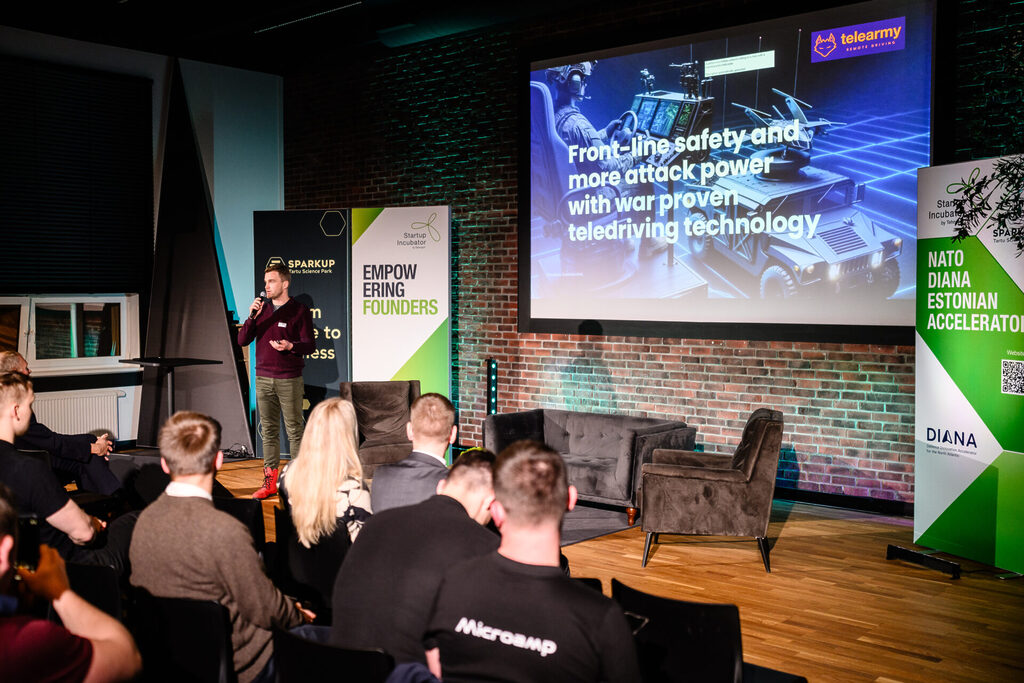
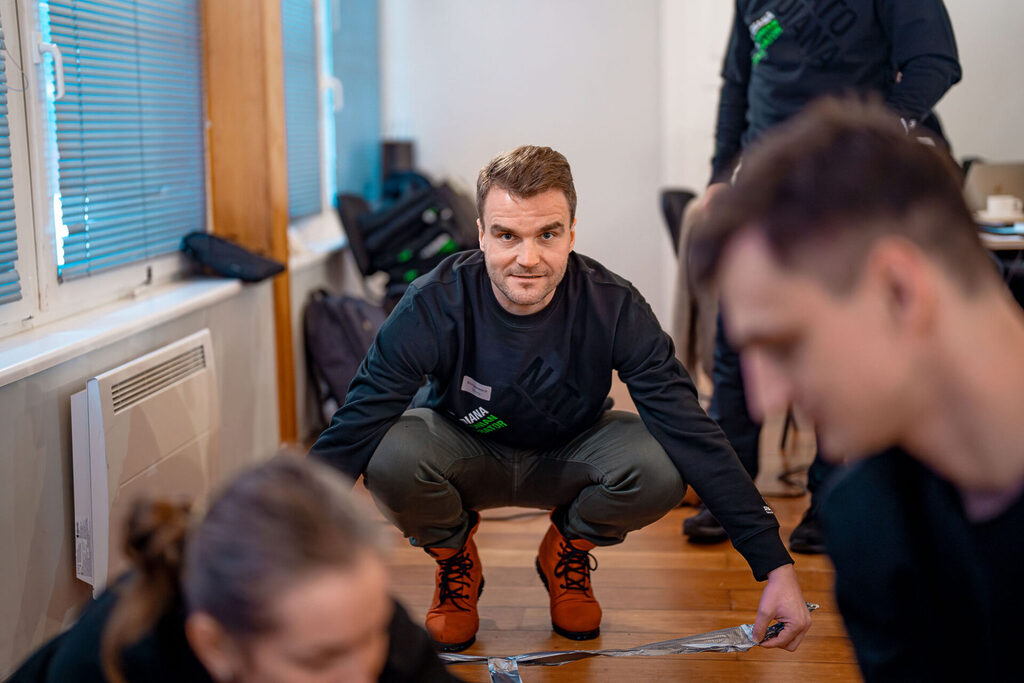
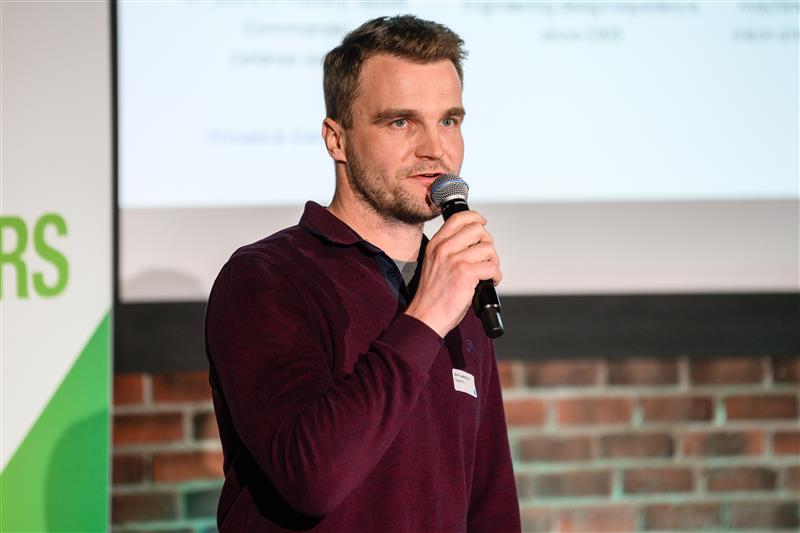
AI in film: Will artificial intelligence turn the creative industry upside down – and why now is the time to act
Estonian film and multimedia creators are recognized worldwide for their distinctive, aesthetic, and socially sensitive work that resonates on many levels. At first glance, it may seem out of place to bring artificial intelligence into this conversation – and we’ve heard this hesitation from some creators in the industry. However, at Tehnopol, after working with technology companies for over two decades, we clearly see that the rise and widespread adoption of AI bears many similarities to the industrial revolution that began centuries ago.
AI is already impacting every sector, including the creative industries – from filmmaking to multimedia. What was once a theoretical vision of the future has now become an everyday tool: a part of the creative process, a visualizer, a script writer, a mood-setter, a provider of context. In fact, this article was also created partly with the help of AI-based tools, which helped us reach a coherent result faster.
On March 12, Tehnopol Startup Incubator’s film and multimedia accelerator IDA Hub hosted a panel discussion on the impact of AI on the film industry. The panel brought together global-minded experts: technology and visual solutions creator Kaspar Kallas, designer and innovation expert Markko Karu, and filmmaker and experimenter Mikk Rand. The discussion was moderated by Marko Russiver.
The conversation touched on everything from the opportunities technology offers to the potential downsides of AI and the emotional dimensions of creativity – from hope and fear to joy. How does AI affect the creative process? What are the risks and the possibilities? And perhaps most importantly – how can creators harness it for their benefit, and should they even try? These were the questions that the panel explored in depth, and if you were there in person, you know how engaging it was. We highly recommend joining us next time. Below is a summary of the key insights and experiences that stayed with us.
AI as a mirror of creativity, not a replacement
One of the main points of discussion was that AI does not replace creativity – it reflects it in its own way. It’s like a cracked mirror: it doesn’t show a direct reflection, but rather how the world might respond to your idea. Many creators hesitate to begin because they fear making mistakes. AI offers a way to experiment boldly – without criticism, time constraints, or resource concerns. It helps shape ideas, offers new perspectives quickly, and allows the creative process to move forward.
The impact is especially significant when it comes to the technical aspects of production. For example, producers often need to create multiple versions of the same story for different markets and investors – a time-consuming and repetitive task. AI can automate this, simplifying the process and freeing up space for bigger ideas. It’s not just about convenience – it’s about enabling the creation of more meaningful content.
Technology must help us connect emotionally
AI can generate the voices of famous actors, produce photorealistic images, and help write scripts. But ultimately, the quality of content is determined by whether the audience believes in it and feels emotionally connected. If the entire creative process is automated, we risk losing something vital – the feeling, the mood, the depth of the message, the authenticity. That’s why some creators consciously choose to work manually, preserving realism and uniqueness.
AI has brought ideas closer to people. Tools that were once only accessible to major studios are now available to everyone through free or affordable programs like Midjourney, Runway, ChatGPT, Blender, and DaVinci. This shift empowers more people to create – but it also relies on learning from pre-existing data, leading to a certain level of standardization. In other words: content made by average people, for average people, about average topics. Algorithms respond to your average preferences, and eventually, we may all be watching the same series – just with different actors and slightly different stories. Shared cultural layers begin to fade. The peaks and depths disappear.
That’s why both the creators and users of this technology carry a great responsibility.
AI as a creative partner, not a competitor
Artificial intelligence will not replace the human creator – but the creator who knows how to use AI will be more competitive. It’s like a game of creative ping pong – the creator throws out an idea, and AI bounces it back in a new form, generating fresh perspectives. In the past, many ideas were left unrealized due to technical limitations. Now, it’s possible to move quickly from concept to execution.
But we must acknowledge that this back-and-forth happens within a closed, limited information system. When we collaborate only with AI, we build on existing data and descriptions.
Thus, the human role in creativity remains essential. AI can help with drafts, but the final judgement still lies with people. The success of a film, game, or story is determined by emotion, intuition, and audience response. Sometimes a scene stays in a film simply because someone in the audience smiled or cried – that’s the human element that no algorithm can replicate.
When we shared the panel’s insights with colleagues, we concluded that if Arvo Pärt’s first tintinnabuli-style composition had been evaluated by AI, it probably wouldn’t have known how to respond. Similarly, at the premiere of Tabula Rasa, the AI-created space would have echoed with silence. This is something we must consider when creating something new and unfamiliar. AI validates based on what already exists – it cannot yet create layers of meaning or recognize high culture. Still, despite this limitation, we need to talk about AI – and we need to do it now.
The time to act is now!
The creative sector needs exceptional people. It did hundreds of years ago, and it still does today. Integrating technology into creativity and learning how to use it effectively is something we must get used to. It simplifies processes, saves time and money, and brings access to knowledge that was previously time-consuming or even impossible to acquire.
At the end of the panel, a young founder developing AI technologies asked a powerful question: What kind of AI solution would you be willing to pay for? That question sparked the speakers’ imagination – and it’s a fitting comma at the end of this article. Because this is a topic we’ve only just begun to explore – a platform for future, thought-provoking discussions.
What kind of AI solution would you be willing to pay for? Perhaps the seed of the next direction lies in that very question.
The activities of the Tehnopol Startup Incubator’s film and multimedia accelerator are funded by the European Union.
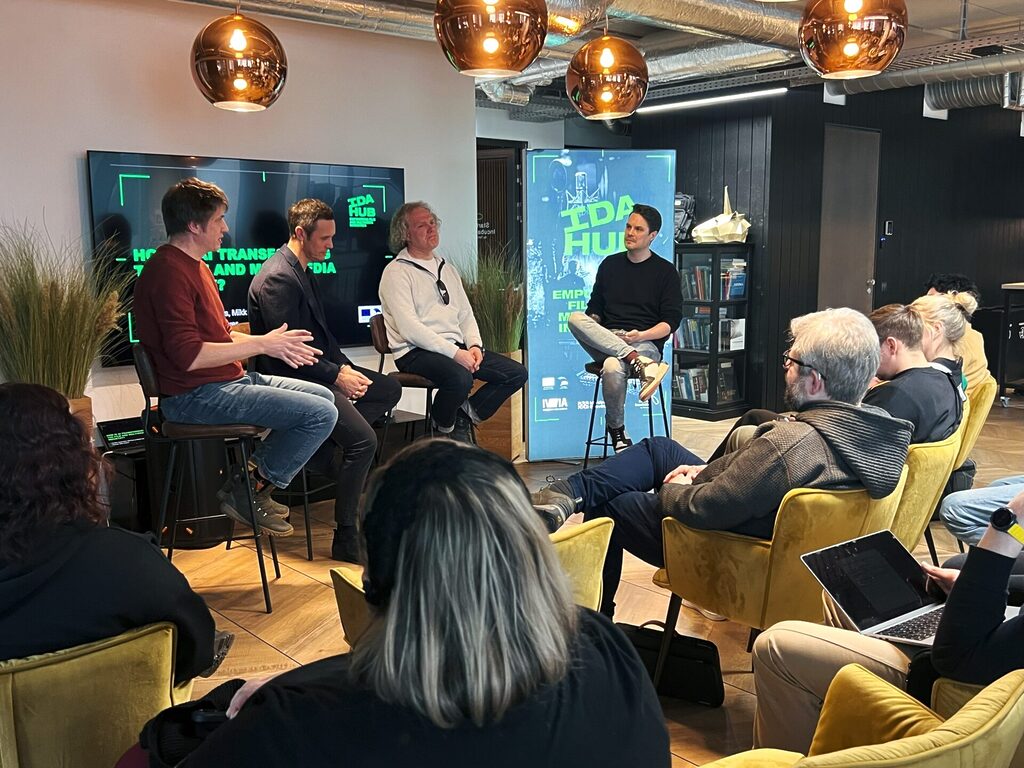
NATO DIANA Estonian Accelerator recap: Five days of innovation, investment & industry insights
Last week, Estonia welcomed back some of the brightest minds in dual-use technology for an action-packed onsite experience at the NATO DIANA Estonian Accelerator. Over five days, the 7 teams tackled masterclasses, investment workshops, pitch sessions, and test centre visits, forging connections and shaping their solutions. Here’s a look back.
Monday – A historic start by the sea
We gathered by the sea near the historic Patarei fortress. The crisp Estonian air (+5°C) set the tone for an evening of networking and casual re-introductions. Some explored the old prison, others opted for warm layers and seaside views.
Tuesday – Venture capital & pitch training
The NATO DIANA Estonian Accelerator officially began at Tehnopol with Sandra Golbreich and Erik Bhullar (BSV Ventures) leading masterclasses on raising venture capital and negotiation tactics. Meanwhile, teams stepped in front of the camera, pitching their solutions for the official video – an exercise in clarity and confidence. We can’t wait for you to see the end result.
Wednesday – Reverse pitches & defence sector insights
Superangel’s Nicholas Nelson and Jaan Kokk guided startups through financial planning and exit strategies. The afternoon featured a reverse pitch session, where investors and defence end-users outlined their needs. Representatives from 2C Ventures, NEDES, unmanned.vc, and SmartCap provided funding insights, while the Estonian Defence Forces, the Estonian Defence League, and Police and Border Guard Board shared real-world challenges.
Thursday – Pitches & defence market strategies
The morning brought the ‘Future of Defence Tech’ event at Tehnopol, where each startup delivered a three-minute pitch to an audience of Estonian dual-use tech peers. In the afternoon, Jaanus Tamm (DefsecIntel) led a session on dual-use negotiations, followed by an industry deep dive from Rene Ehasalu of the Estonian Defence and Aerospace Industry Association.
Friday – Test centres & real-world tech applications
The final day featured hands-on visits to some of Estonia’s top test centres. At TalTech’s 5G facility, teams explored the Faraday cage and drone testing capabilities. At CR14, they delved into NATO-grade cybersecurity exercises and resilience testing. The tour ended at the Estonian Academy of Security Sciences, where robotic systems and remote sensing technology were in focus.
By late afternoon, it was time to say goodbye – exhausted but inspired, with fresh insights and new strategic connections.
Final thoughts
The NATO DIANA Estonian Accelerator onsite week wasn’t just about listening to experts—it was about getting hands-on experience with real challenges. Whether it was refining pitches, meeting investors, or impressing defence end-users, every moment was a chance to adapt and improve. Startups learned that venture capital isn’t just about numbers on a slide deck, but about negotiation, relationship-building, and proving real-world impact. The test centre visits reinforced the need to validate tech in real-world conditions before deployment.
As these startups move forward, the real challenge begins – turning all these insights into action and proving that their solutions can stand up to the demands of the dual-use sector. One thing is certain: the connections and lessons from this week won’t just stay in Tallinn—they’ll shape the future of dual-use tech far beyond Estonia.
Next up? A week filled with communication-topics in Tartu in April.
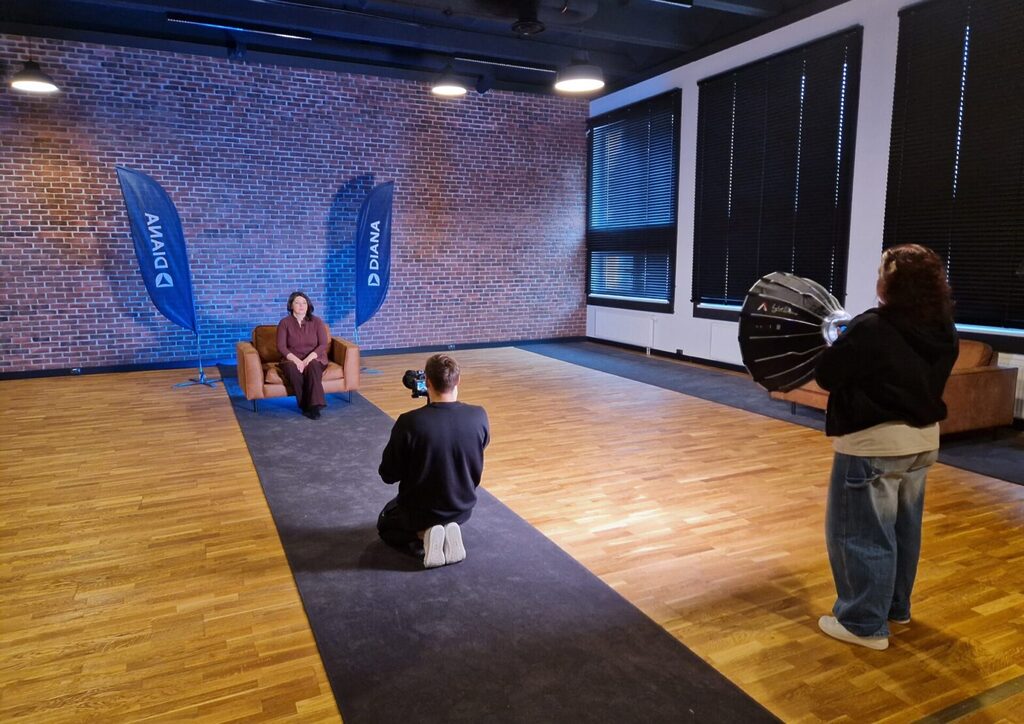
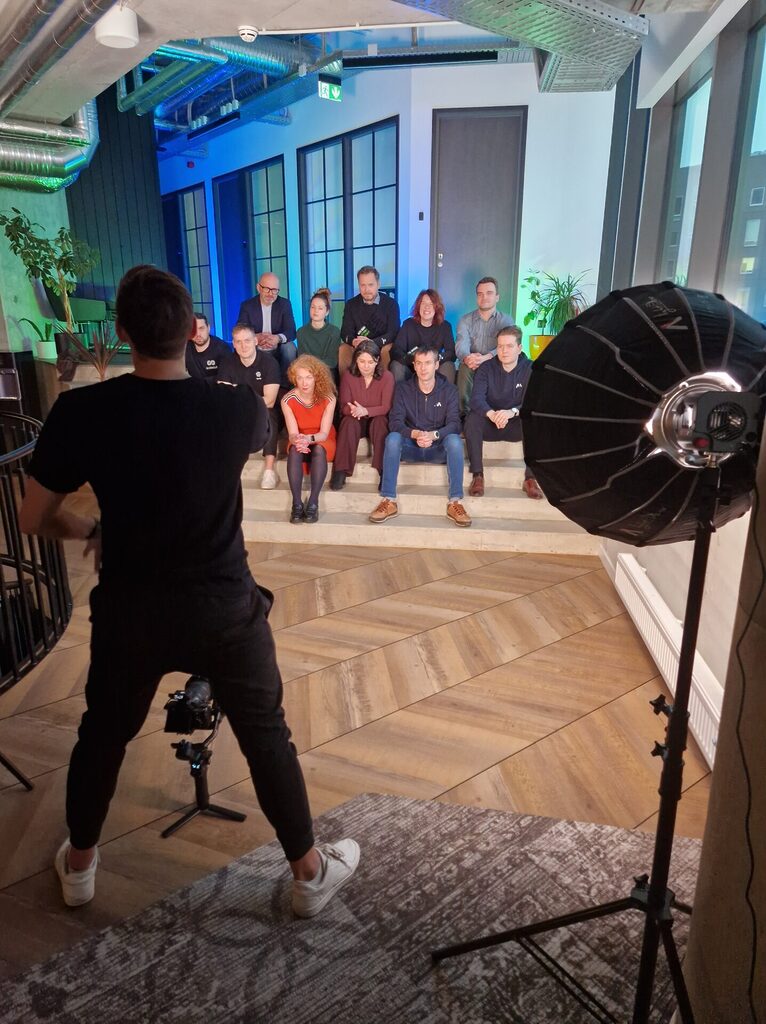
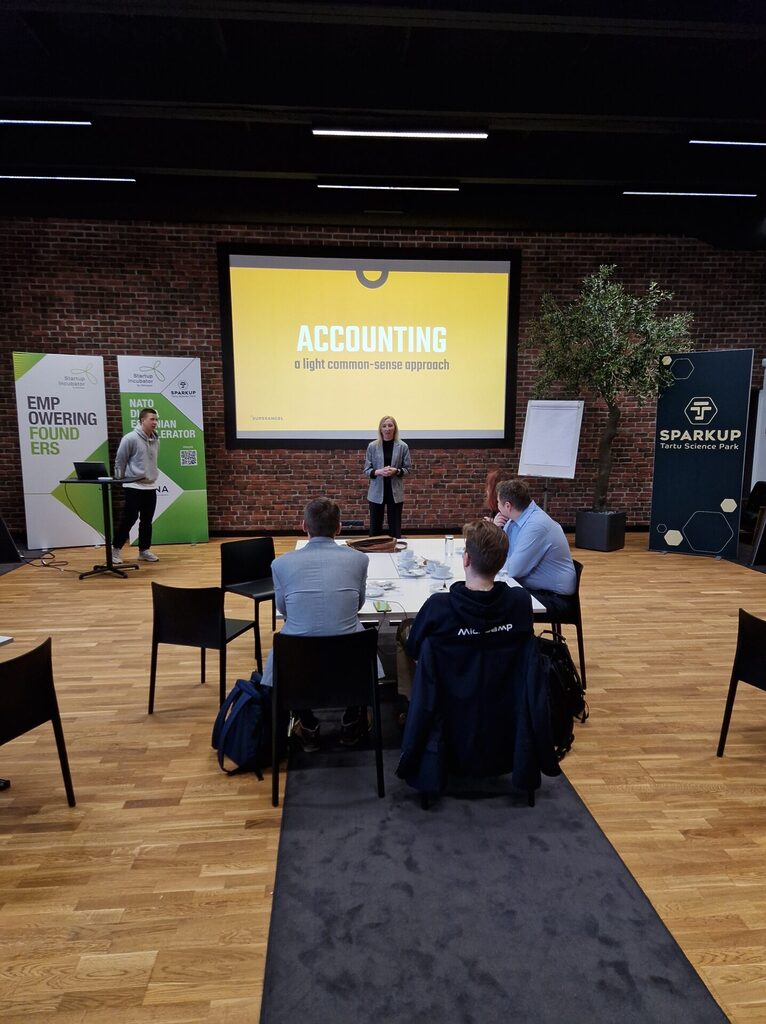
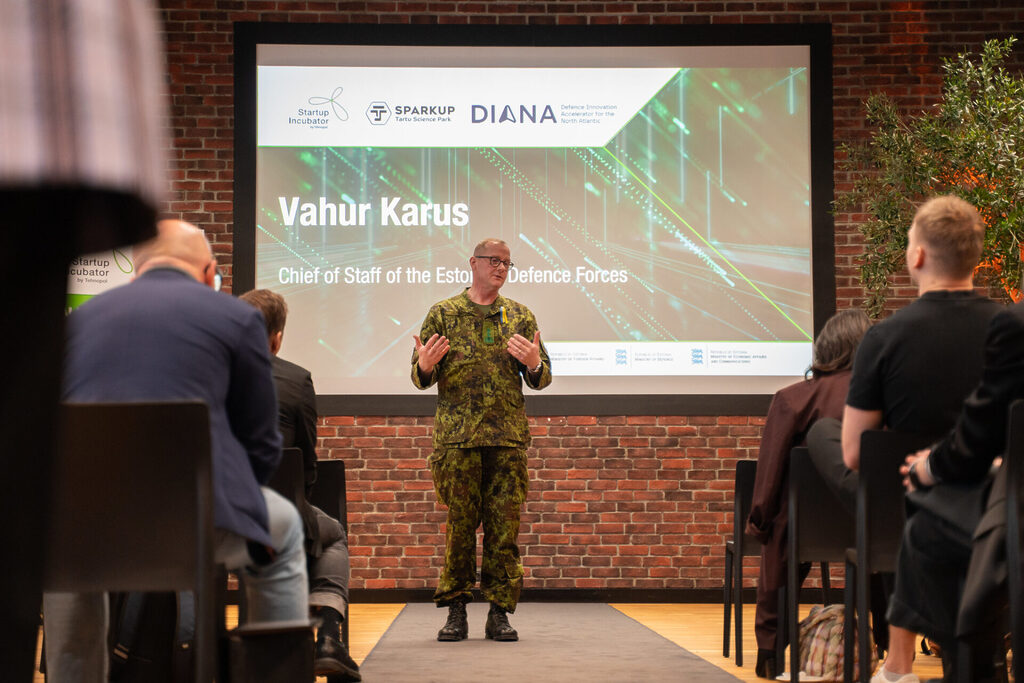
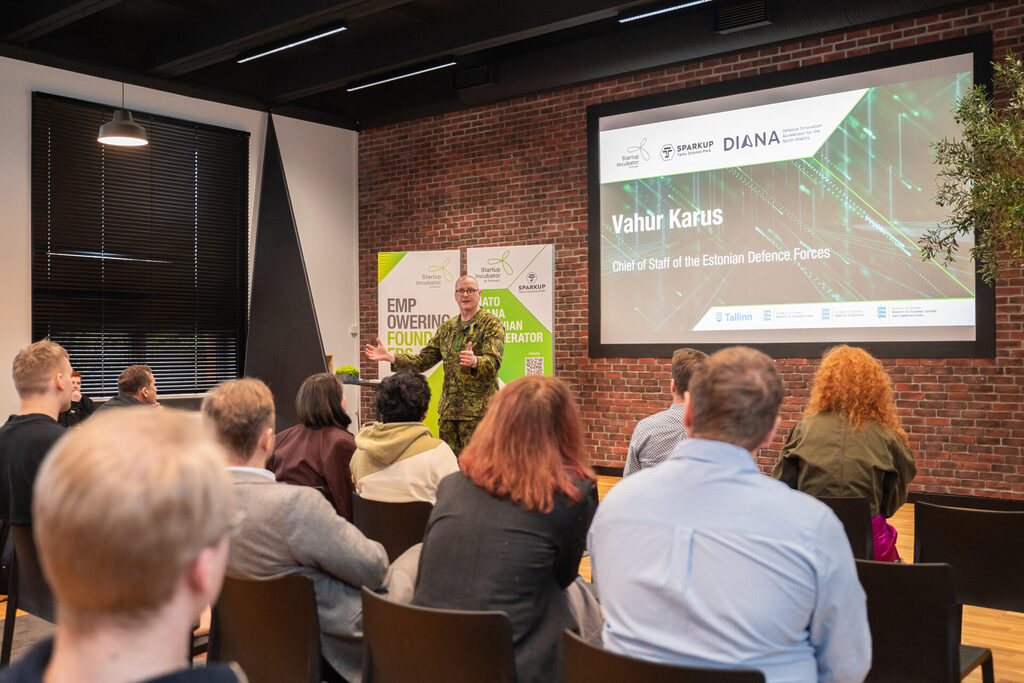
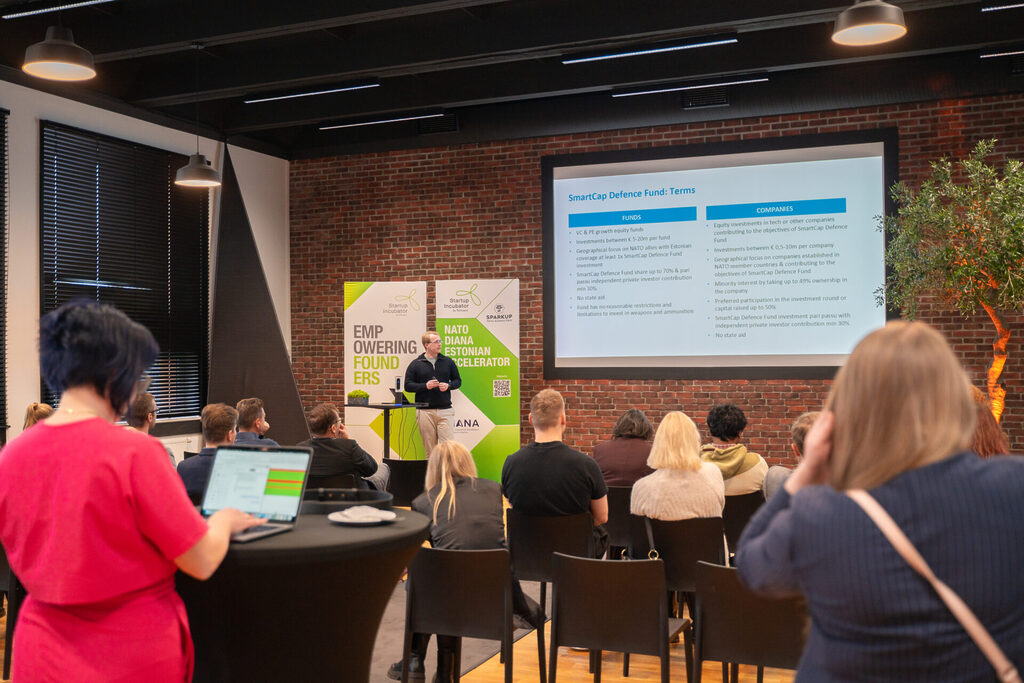
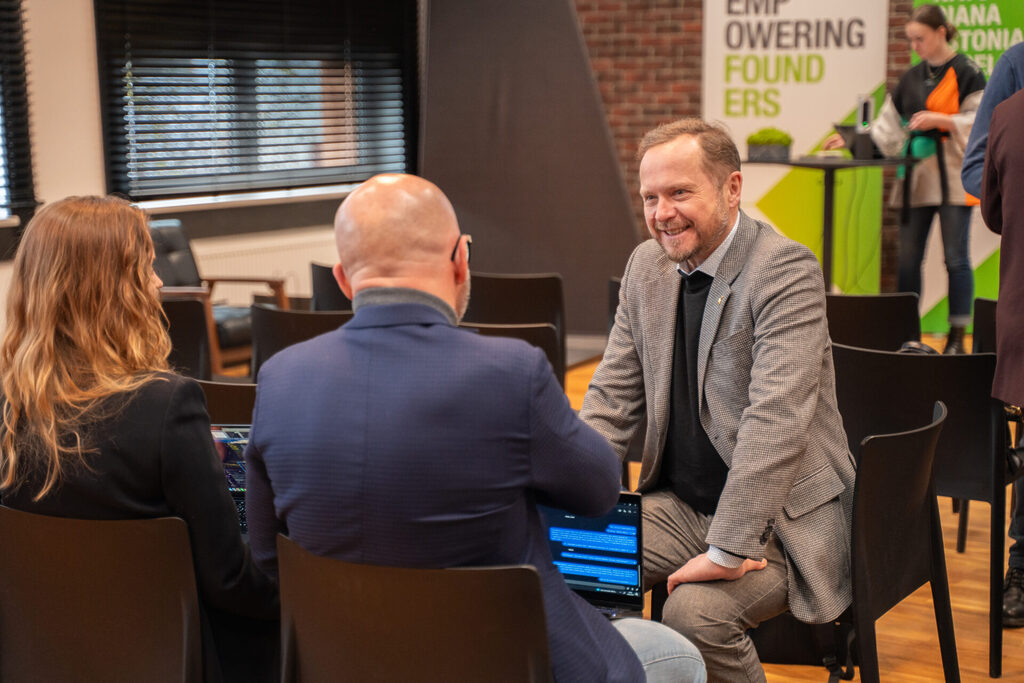
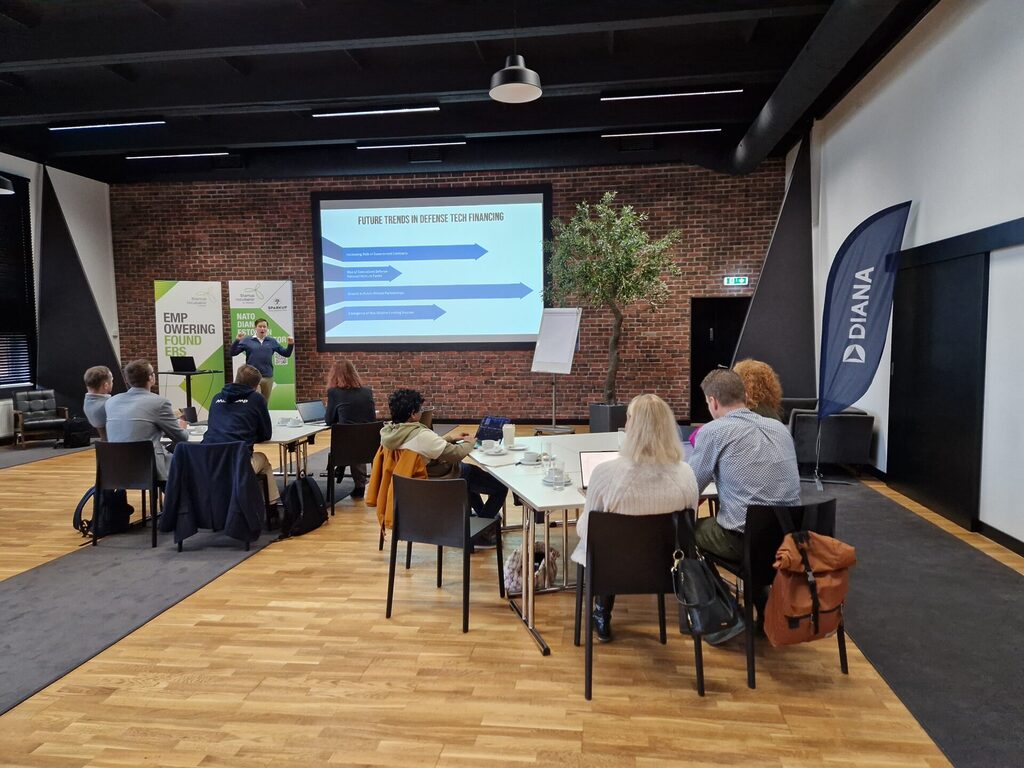
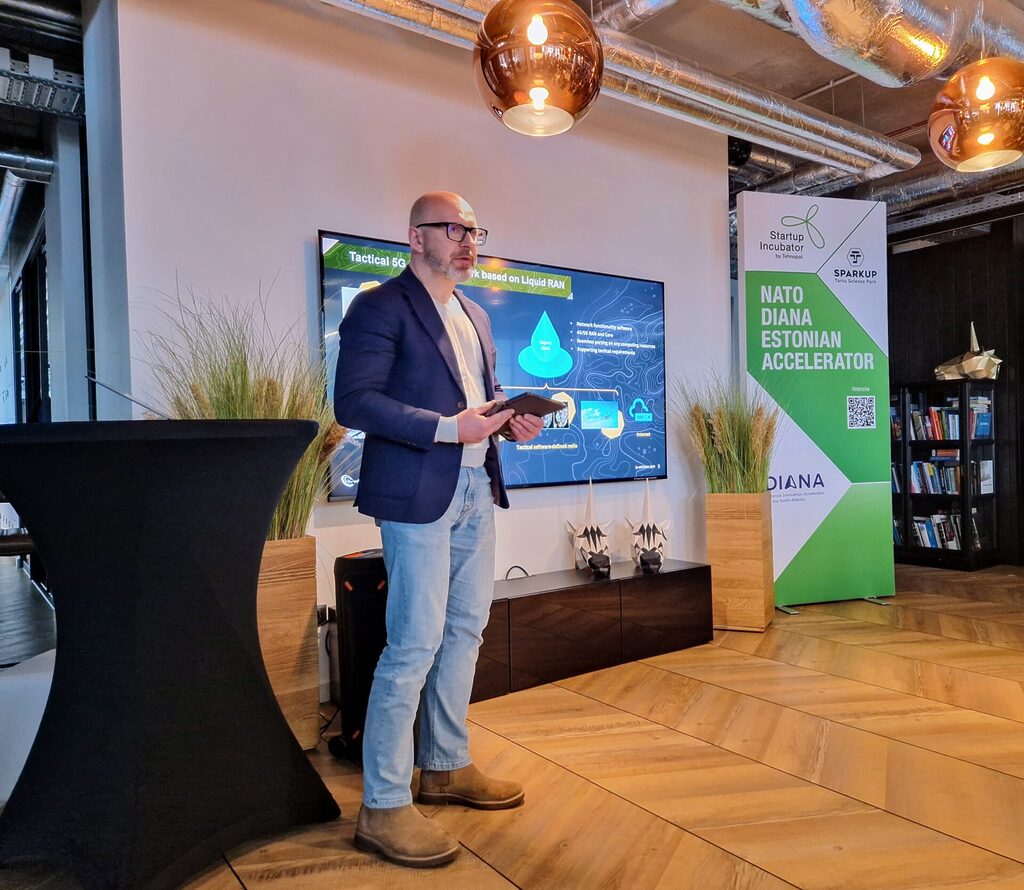
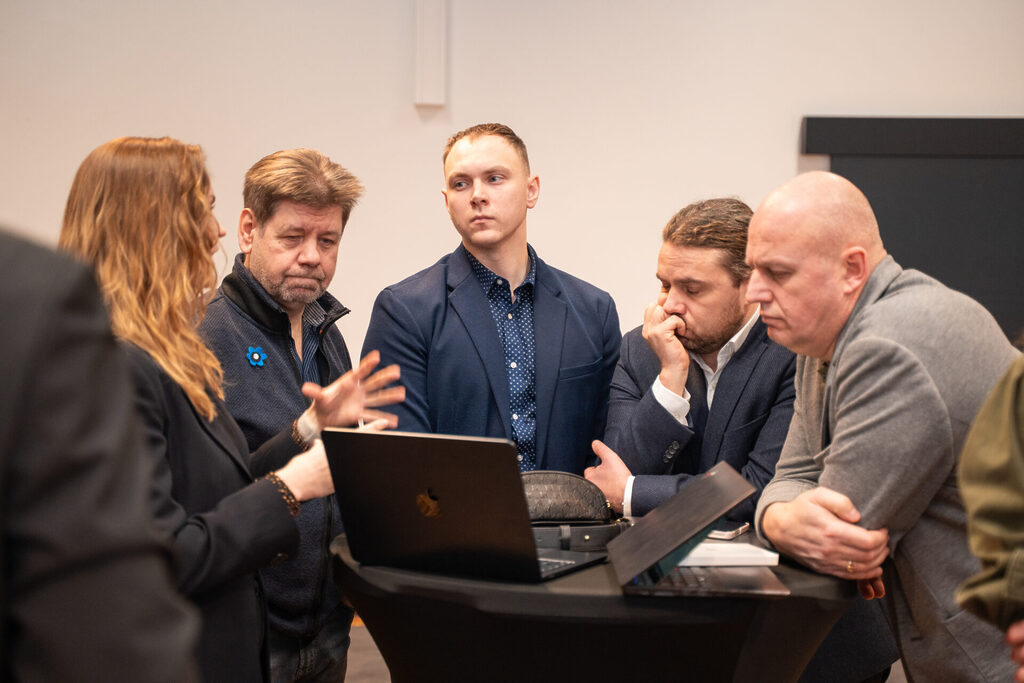
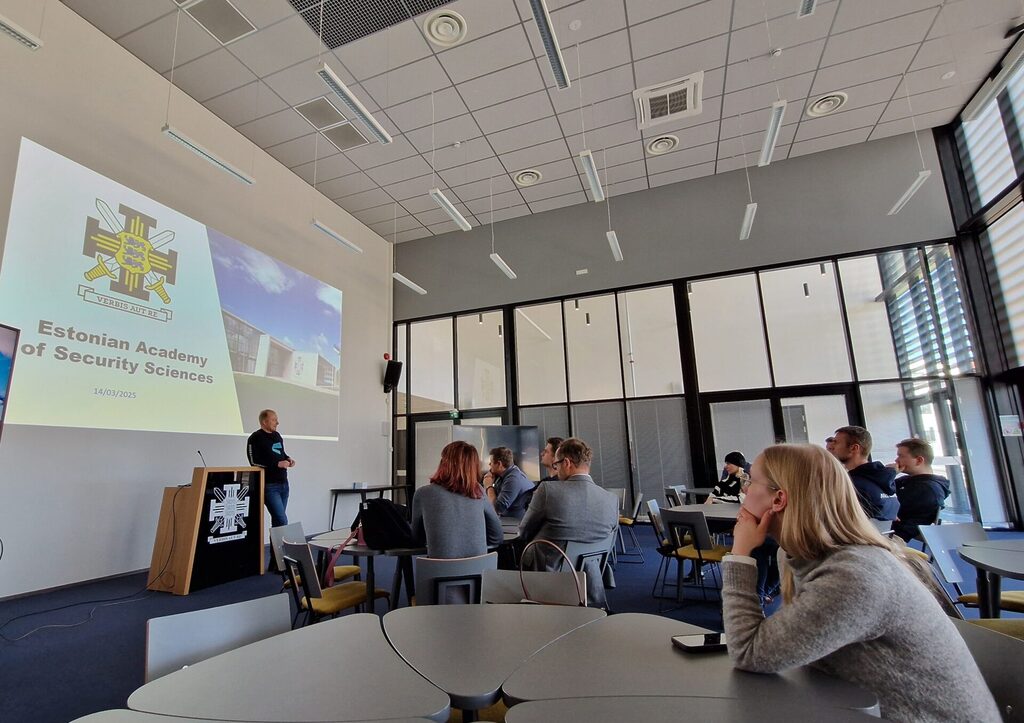
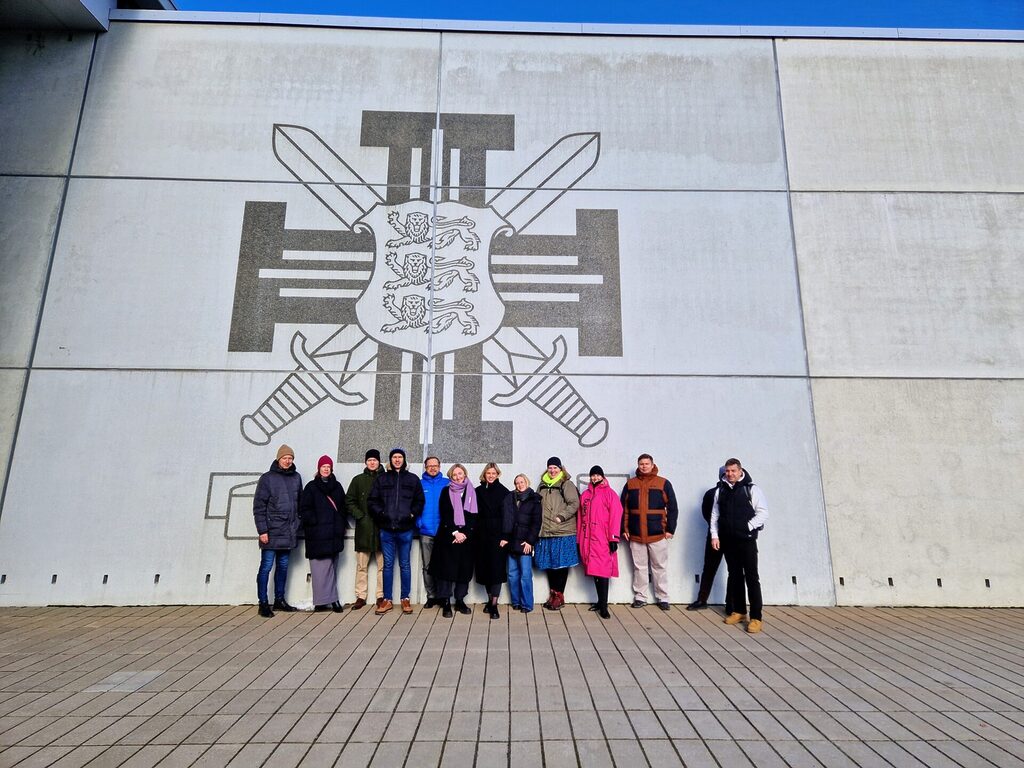
The film industry needs technology and your idea could be the next big breakthrough. Apply now to the Film and Multimedia Accelerator!
The Tehnopol Film and Multimedia Accelerator, which is part of the IDA Hub film campus being developed in Jõhvi, is looking for new and ambitious teams who want to drive innovation in film production and multimedia work.
The news last week that the building contract for the Jõhvi film campus had been signed was very exciting for us and for our partners. The doubters who said that Ida-Virumaa could not be a base for new technology and a major platform for cinematic advances have been shown to be mistaken. Technology develops so fast that a technological approach can achieve a great deal without anyone needing to go anywhere near Hollywood.
Head of the Tehnopol Film and Multimedia Accelerator programme Olga Kurdovskaja is convinced that IDA Hub can be not just a film studio but also a real platform for technological innovation and for developing startups, and many experts in film and technology agree with her. A panel at the JobFair 2025 organised by kood/Jõhvi in Jõhvi identified a lot of key points that must be grasped by those who want to do more than just dream and want to take the development of film into their own hands.
The famous producer Madis Tüür of Münchhausen Film drew a parallel between the startup world and film production, emphasising that Estonia already has experience of working on large international projects. There is no sense in thinking about building a new Hollywood in Estonia though.
“That would be unrealistic and unnecessary and our main opportunity lies in offering something different. The Baltics have their own strengths in our nature, our industrial architecture, our new technological solutions and our flexibility. We don’t need to build some pointless studio as an exact copy of Los Angeles, but we should create something that Hollywood and the other big international film markets need”, he explained.
Olga Kurdovskaja is certain that development in the technology sector is not only the future of cinema, but also gives new perspectives to young people. Young people have said that they want to work in an innovative environment with attractive salaries and modern working conditions. “We are not directly creating jobs but we are providing the knowledge, tools and support that can help people launch their own projects and find a place in the new technological ecosystem. We are already offering the opportunity of attending the accelerator programme in Ida-Virumaa, learning from the best mentors and experts, and breaking into international markets”, she said.
“I have been asked what the point is in creating new solutions when there are already so many out there. It is hard to agree with that opinion though. There are a lot of solutions out there, just as there are a lot of films, but not every film will win an Oscar. Our programme is up and running, the application round is open, and your idea may be the one that makes the next leap forward in the film industry. Applications to the accelerator are open until 16 March”, she commented, adding that the key criteria for selection are that there must be a technological idea and a team of at least two people with a prototype of their solution, though the prototype does not have to be fully functional.
“We have tested and updated the accelerator programme and we now have seven modules instead of six as we have added training in artificial intelligence because we see that the new technology is entirely changing the rules and the processes. There is no way we can ignore AI. It is important that we understand how it works and also the opportunities, challenges and risks it brings”, she stressed.
The programme lasts six months and contracts can be extended for a further six months. Each team has a dedicated mentor, access to experts in the field and the international connections they bring, and the chance to massively increase the scalability of their product.
“It is important to understand that the Estonian market is very small and so as soon as our teams are ready for investment or to to enter foreign markets, we help them in every way we can”, explained Kurdovskaja.
She underlined that the Tehnopol accelerator programme is not only for launching startups, as it is also an excellent chance to learn, to gain new skills and to make contacts in the industry.
“Salaries are high in the technology sector, and it is a great benefit that technology companies are being established in our region. We can only gain from training successful people and professional specialists, and indeed the whole economy gains from it”, she observed.
The mentors and experts at the Tehnopol film and multimedia accelerator are highly experienced and have international connections that can help lift your startup to the next level. Those experts include Tiina Lokk, the founder of PÖFF; Esko Rips, producer at Nafta Films; Indrek Kasela, an angel investor; Pelle Vellevoog, a film and multimedia expert; Katre Valgma, Head of ACME Film Eesti; Maarit Mäeveer-Eller, founder of Votemo; Kaspar Kallas, a film and multimedia expert; and Lev Dolgatsjov, an angel investor.
IDA Hub brings together film, technology and business, providing knowledge and skills, and access to international networks to help make your startup firm into a global phenomenon.
Apply now and take your startup into a new dimension.
The Tehnopol Film and Multimedia Accelerator is funded by the European Union.
Is film the next big startup opportunity? Insights from the Film and Multimedia Accelerator panel at JobFair 2025
Last week, kood/Jõhvi JobFair brought together over 200 participants—young software developers, startup enthusiasts, film professionals, and technology sector leaders. One of the event’s highlights was the Film and Multimedia Accelerator panel, organized by the Tehnopol Startup Incubator, where experts discussed how IDA Hub is not just a film studio but a launchpad for technological innovation and startup growth.
The panel featured Teet Kuusmik (Ida-Viru Investment Agency), Madis Tüür (Münchhausen Film), Elina Dubova (Startup Estonia), and Aleksander Gansen (WOF Labs & Banana Conf), with Mihhail Komaško (ERR) moderating the conversation.
IDA Hub: More than a film studio
“All the offices, studios, all the extra businesses and companies that will be growing just because we have this complex here. It’s a great infrastructure for startups to come and test out their ideas straight away. Because they can come there, ask for the base, for the problems. They can get the real-life feedback. You, as a startup, or the one who wants to bring to life something that is really needed in the industry or that will solve the current problem of the industry, you get it. Just come to IDA Hub and make Ida-Virumaa great again,” said Teet Kuusmik, opening the discussion.
The film industry needs more than just great ideas—it needs a strong ecosystem
At this point, Mihhail Komaško steered the discussion toward the fundamental structure of the film industry, highlighting that enthusiasm and fresh ideas alone are not enough—experience and an established ecosystem are also essential.
“But, you know, I have finished film school. And I know something about the film industry. And I know that, especially when we speak about technologies, we must think not only about the brilliant minds. And actually, in our very modest country, we have a lack of people, a lack of minds. But we must speak about experience, years and years of experience, and ecosystem.”
He pointed out that the biggest players in the industry didn’t become leaders overnight—they built their foundations over a century.
“And if we look at the biggest producers in the film industry, for example, if we speak about the technical part, ARRI—it’s a German company that has produced the best cameras for the film industry since 1924. And all major film studios, American film studios, or European film studios, were established in the early 20th century. So, it’s 100 and more years of experience, ecosystem, knowledge, etc. But we don’t have such experience here in Ida-Viru.”
Madis Tüür: Now is the time for innovation
At this point, Madis Tüür took the floor, drawing parallels between the film industry and the startup world. He emphasized that Estonia already has experience working with international productions, including Hollywood films.
“If you think of filmmaking as a business, it’s very similar to the startup world. Every film is like a new startup – you have an idea, you look for investors, you assemble a team, you produce the product (in this case, a film), and then you have to bring it to market. And just like startups, films are highly risky – most of them don’t achieve great success, but those that do can be incredibly profitable and even reshape the market,” Tüür explained.
“The film industry is actually very conservative – every shooting day is extremely expensive, which means that technological experiments that could jeopardize production are rarely allowed. But on the other hand, when a major technological shift occurs, everything changes. The last big transition happened when the industry switched to digital cameras – and that was the moment when Estonia was able to jump in.”
“We didn’t have film labs, film stock, or production capabilities. We had to import everything, and it was costly. But the arrival of digital cameras changed the game. Even ARRI had to adapt to the new era, and at the same time, a new player emerged – RED, launched by… a sunglasses manufacturer! RED shook up the entire industry, and although ARRI eventually caught up, it proved that even smaller players can enter the market,” Tüür said.
He then stressed that IDA Hub should not try to copy Hollywood but instead find its own unique niche.
“There’s no point in trying to build another Hollywood – it wouldn’t be realistic or necessary. If Hollywood wants Hollywood, they will stay there. Our main opportunity is to offer something different. The Baltic states have their own strengths: our nature, industrial architecture, new technological solutions, and flexibility. We don’t need to aim for a massive studio that looks exactly like Los Angeles – we need to create something that Hollywood and other major film markets actually need,” he added.
“We already have experience working with international productions – Hollywood films have been shot here, and high-budget European co-productions have taken place in Estonia. This means we’re not starting from scratch; we already have industry connections and know-how. The question now is how we can utilize this potential even more effectively,”Tüür explained.
IDA Hub is not just an experiment – it works
At this point, Mihhail Komaško asked Aleksander Gansen whether IDA Hub is truly a sustainable initiative and if startups can find real opportunities here.
Gansen responded: “We have been testing the startup landscape in Ida-Virumaa for years now, and we see interest growing. This very place where we are sitting—just a few years ago, it was merely an idea, but now it’s a reality.”
According to him, IDA Hub is one of the first initiatives built on collaboration between strong organizations and real industry needs.
“The companies and experts behind IDA Hub have the experience and knowledge to achieve real results. We are not starting from zero—we already have technology parks, investors, and an active industrial sector to work with.”
He pointed out that previous investments in Ida-Virumaa have not always delivered long-term impact, but IDA Hub follows a different logic.
“I have seen several projects aimed at developing Ida-Virumaa, but often they have lacked a strong economic foundation and real market demand. IDA Hub is clearly designed to meet the actual needs of the industry, and there are already clients here looking for innovative solutions.”
“Additionally, IDA Hub does not rely solely on grants. The focus here is on a sustainable business model and a long-term strategy. That is what makes this initiative stronger than many previous projects.”
Elina Dubova: We are at the beginning of something big
Wrapping up the discussion, Elina Dubova emphasized that while the startup ecosystem in Ida-Virumaa is still in its early stages, it already has a strong foundation and a clear direction for growth: “The Ida-Viru startup ecosystem is still developing, but I truly believe we are at the beginning of something big. I see a future where Ida-Viru becomes a thriving and highly sought-after startup hub—especially in the multimedia and film industry. It will be a place where startups emerge, ideas are tested, and clients can access a full range of services tailored to their needs.”
What’s next? Bring your idea to life!
The Film and Multimedia Accelerator panel proved that innovation and collaboration in filmmaking are not just ideas for the future—they are happening right now.
Applications are open until March 16! If you have a team, a prototype, or an MVP, this is your chance to be part of Estonia’s first accelerator focused on film and multimedia innovation.
Our mentors and experts bring invaluable experience and global connections to help take your startup to the next level. Among them are: Tiina Lokk (Founder of PÖFF), Esko Rips (Producer, Nafta Films), Indrek Kasela (Angel Investor), Pelle Vellevoog (Film and Multimedia Production Expert), Katre Valgma (Head of ACME Film Eesti), Maarit Mäeveer-Eller (Founder, Votemo), Kaspar Kallas (Film and Multimedia Production Expert), Kaupo Karelson (Producer, RUUT), and Lev Dolgatšjov (Angel Investor).
IDA Hub connects film, technology, and business experts to provide you with the knowledge, contacts, and access to an international network that can take your startup global.
Apply now and take your startup to the next level!
The Film and Multimedia Accelerator is supported by Tehnopol Startup Incubator and co-funded by the European Union.
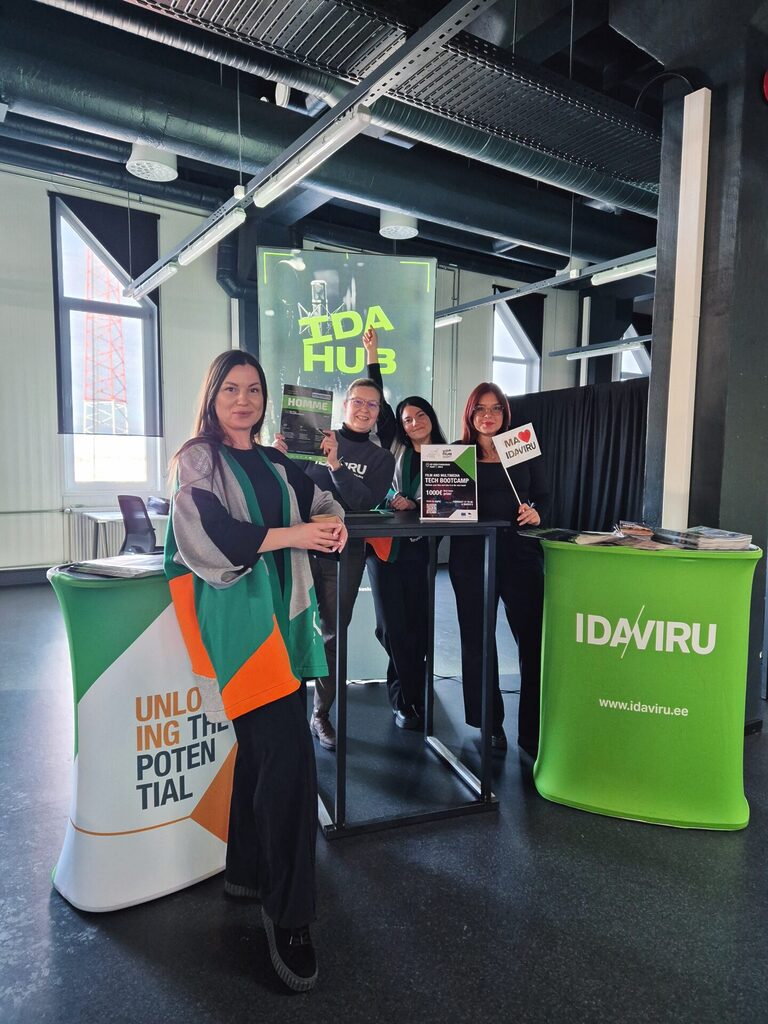
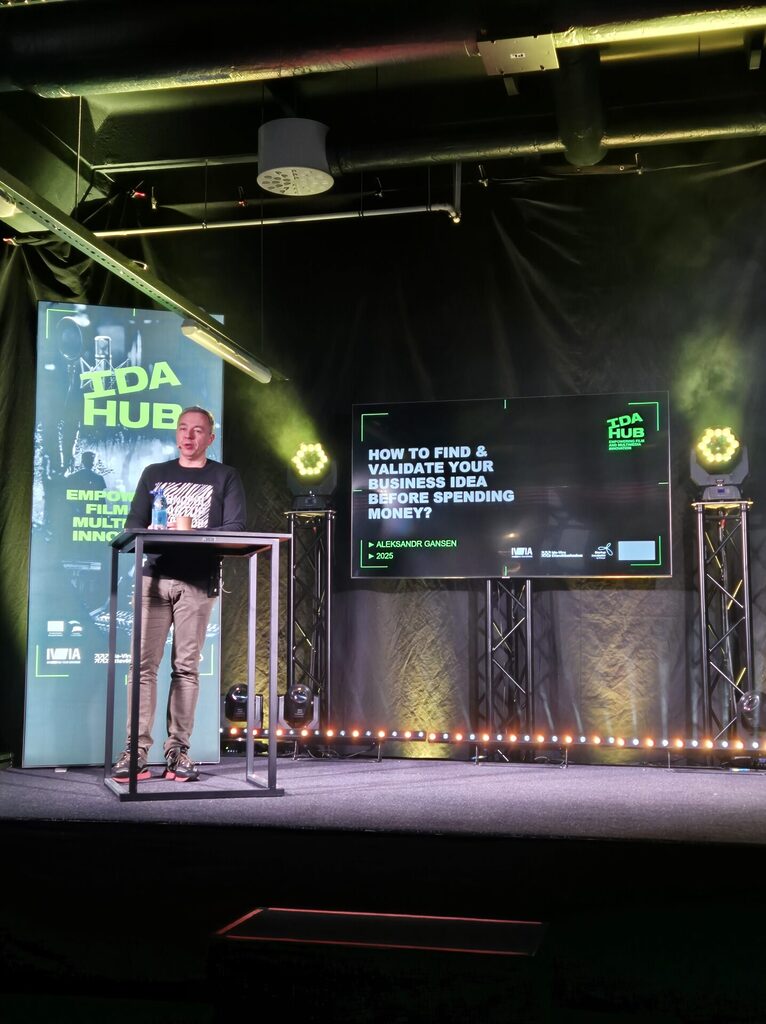
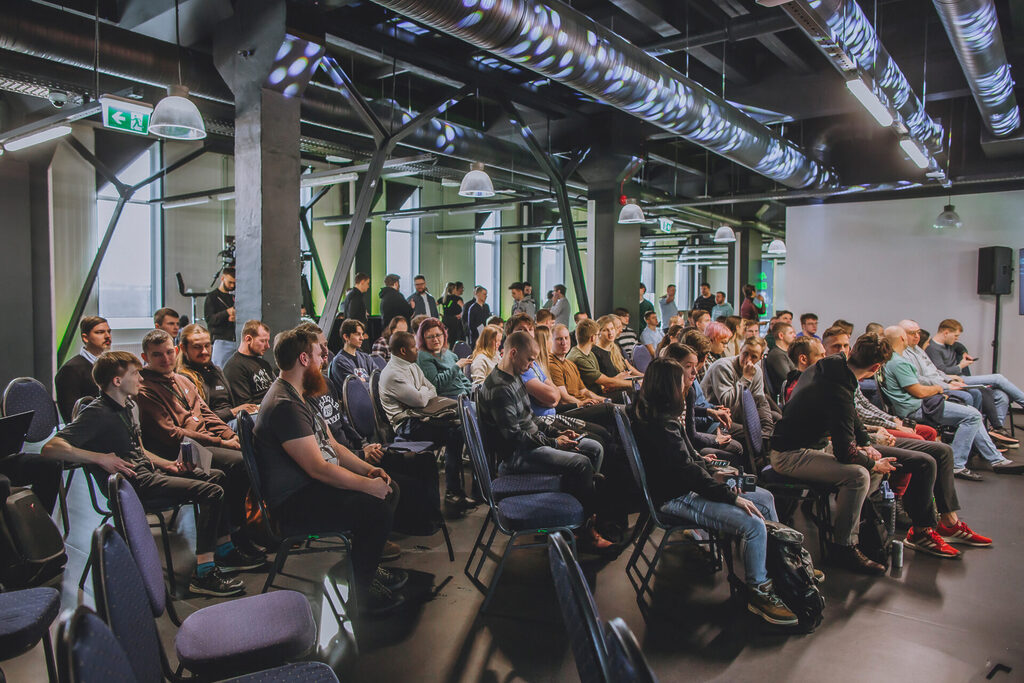
NATO DIANA Accelerator alumni GaltTec secures €1M to power drones and IoT devices with next-generation fuel cells
GaltTec, an Estonian deep-tech startup developing micro-tubular solid oxide fuel cells (mSOFCs) for portable and off-grid energy solutions, has successfully closed its pre-seed funding round, raising a total of €1 million from private investors and grants. The investment will accelerate the company’s mission to provide lightweight, long-lasting power solutions for drones and IoT devices, reducing reliance on conventional batteries. GaltTec was the only Estonian startup in the NATO DIANA Accelerator’s first batch.
The investment round was led by 2C Ventures, a cleantech focused venture capital fund committed to advancing climate-neutral economy. The Fund seeks to back exceptional science based start-ups developing transformative technologies and is managed by Martin Koppel, Taavi Veskimägi, Herty Tammo and Hendrik Reimand. The round was also joined by various well-known angel investors and entrepreneurs, including Kuldar Väärsi, along with Bitsick OÜ and ModulEnergy OÜ, further strengthening GaltTec’s network of strategic backers.
Private investment complements public grant funding from the Estonian Business and Innovation Agency, the European Space Agency Business Incubation Center, the Estonian Ministry of Defense, the State Shared Service Centre, and the NATO DIANA Accelerator program.
Founded in 2022, GaltTec is pioneering fuel cell technology to meet the growing demand for lightweight, sustainable, and highly efficient energy solutions. The company’s fuel cells are designed to significantly extend operational endurance for drones and IoT devices, making them a game-changer for industries that rely on long-lasting, portable power sources.
“This investment allows us to accelerate the development of our next-generation fuel cell technology, bringing us closer to delivering lightweight, high-efficiency power solutions for drones and off-grid devices,” said Glen Kelp, CEO and Co-Founder of GaltTec.
GaltTec already partners with leading drone manufacturers, including Skycorp Technologies, a European pioneer in hydrogen-powered drones, showcasing the real-world potential of its technology.
“GaltTec’s fuel cell technology has the potential to redefine how we power drones and IoT devices, offering a sustainable alternative to traditional batteries and fossil fuels,” said Martin Koppel, Partner at 2C Ventures. “We believe their innovation is a game-changer for cleantech and energy resilience, and we’re excited to support their journey as they scale and expand into global markets.”
GaltTec’s dual-use strategy positions its fuel cells as a critical solution for both commercial and defense sectors. In 2024, the company became the first Estonian startup to join the NATO DIANA accelerator program, which supports deep-tech companies contributing to national security and defense. The accelerator in Estonia is led by the Tehnopol Startup Incubator together with the Sparkup Tartu Science Park.
Additionally, GaltTec has signed a cooperation agreement with the Estonian Defence Forces to test ethanol-based fuel cells, further reinforcing the strategic importance of its technology.
With strong backing from both private and public sectors, GaltTec is well-positioned to scale its technology, expand into new markets, and drive the future of sustainable energy solutions for drones, IoT devices, and beyond.
On the photo: GaltTec co-founders Laura Elise Arvisto, Glen Kelp, Tanel Tätte (photo taken by Paul Meiesaar)
The Estonian cyber security startup Phishbite is aiming to enter neighbouring markets
Tehnopol is part of the joint Northbound Scaleups (NBSCALE) project, which helps companies expand into new markets. The Estonian startup Phishbite went to visit Poland to look at possible target markets.
The goal was to meet at least five possible partners. “Making contacts was quite time-consuming and it was quite difficult to get through to the right people by telephone from here. The meetings we held went well, and we also managed to organise a couple of extra ones on the spot as well as those we had agreed in advance”, said co-founder of Phishbite Urmo Keskel.
They have now signed a contract with one partner, and are negotiating with a couple more. Keskel noted that although the first steps have been made, there is still a lot of work to do.
“The meetings we had showed that even though you can do a lot in online meetings, they are no substitute for real meetings in person. The contacts that you make when you meet people face-to-face are much stronger and they make things move much faster”, he said.
As well as meeting possible partners to work with, the company visited the Estonian Embassy in Warsaw. “That was a very good experience for us and we got a lot of good advice there about who else to speak to, and an invitation to a local startup event that happened the next evening”.
Why Poland?
Poland was chosen as a target market for several reasons, the first of which is that it is a very big market with a population of 38 million. The Polish state is investing quite a lot in raising awareness in society about cyber security and the indexes for cyber security show that both Poland and Estonia are at a similarly very high level, as Poland is in second place on the National Cyber Security Index and Estonia is in fifth. Urmo Keskel said that this makes things easier for them because they do not have to work so hard to raise general awareness.
The Polish economy is growing fast, and Keskel noted that Warsaw is becoming the new technology centre of Eastern Europe, where a great number of international financial and technology companies are opening their new centres.
“Poland is also attractive because fewer of our competitors offer support for the Polish language, which they do for the languages used more broadly in Europe”, he noted. The company also found that it is quite easy for Estonians to do business with Poles. “They are very pragmatic and precise, just like us. It seems that the war in Europe has brought us much closer to the Poles and we felt that we were warmly welcomed there as brothers”, Keskel said.
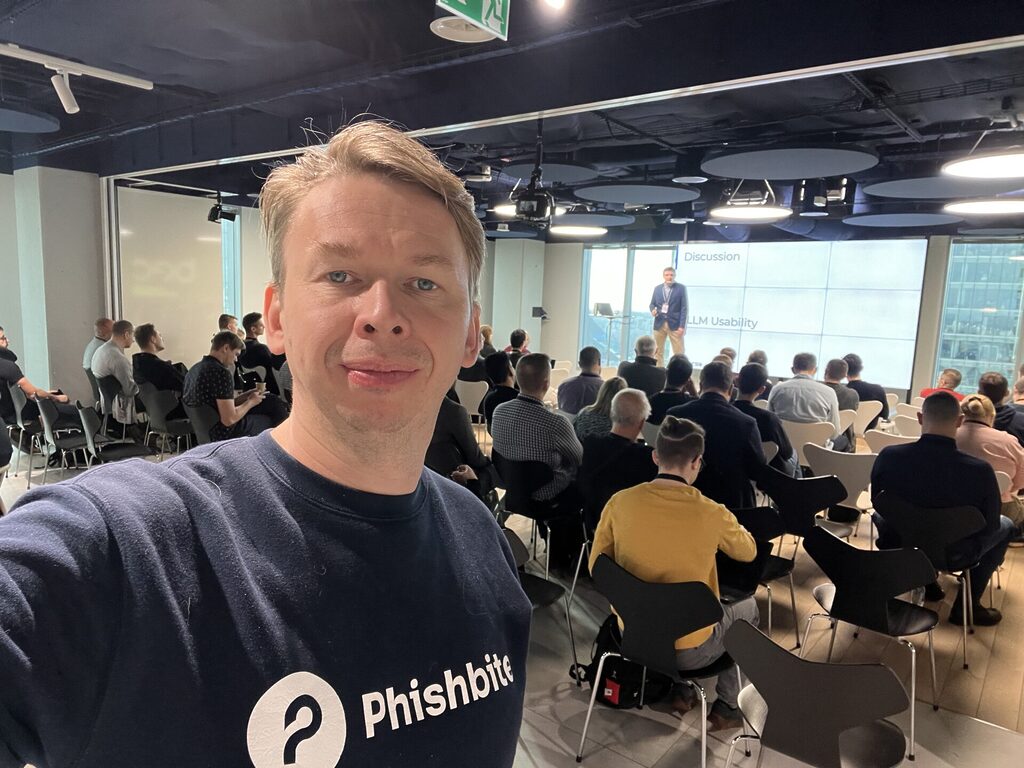
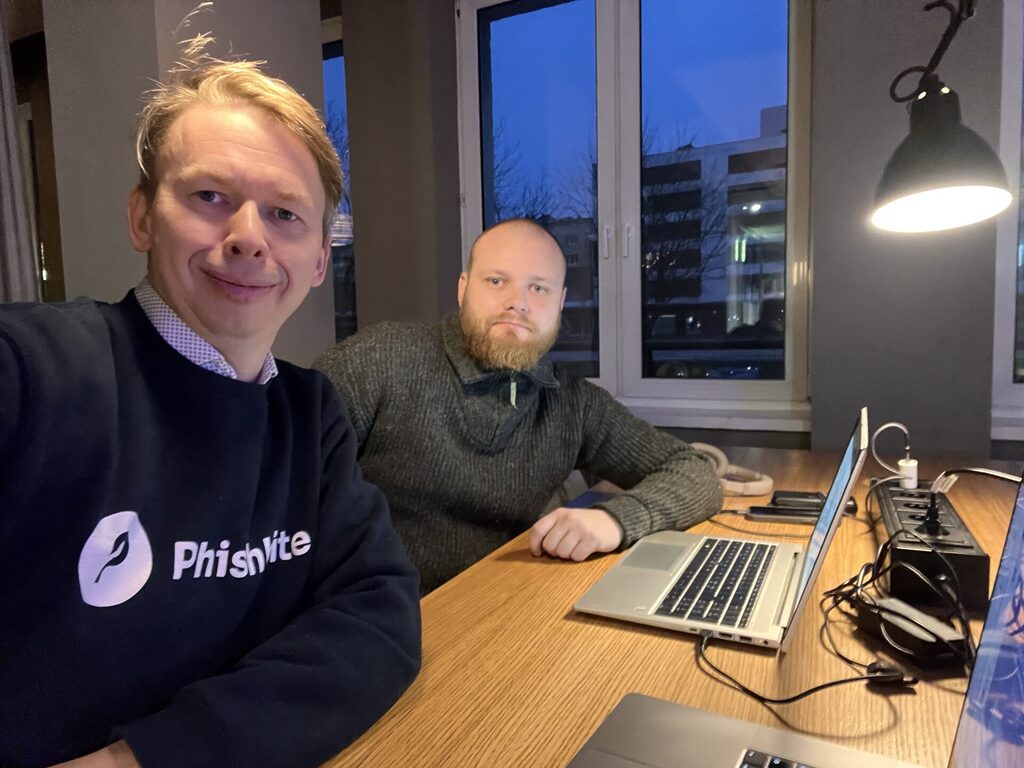
He explained that their biggest international competitors are not very active in the Polish market, though there are some local companies that offer similar services. “Our advantage is that our service is very easy to introduce and is highly autonomous, so it does not need constant tuning and maintenance because using AI lets us automatically adapt the phishing emails we send out to match the profile of the business and the employee”, he added.
Some alterations would however be needed for the Polish market. It is important for Phishbite that their phishing emails take account of the local context in the same way that scam emails do now. The phishing emails sent out in the name of Omniva and LHV that are common in Estonia are already quite well written, and local brands and the local language need to be used in the same way in other markets too. “We use large language models to create our phishing emails, and so it is quite easy to make the changes that we need in order to adapt our products for different markets”, said Keskel.
Plans for the near future
Phishbite is planning to have monthly turnover of 30,000 euros by the end of the year and the target for total turnover for the year is 240,000 euros. Foreign markets that it is looking at alongside Poland are Czech Republic, Latvia and Lithuania. “We are using the agent model for sales in Latvia and Lithuania, and in Poland and Czechia we have local sales partners. If we can reach 25% of our turnover this year coming from outside Estonia, we can be very happy with our progress into new markets”, said Keskel.
A new product that Phishbite will soon be releasing is a self-service portal that gives clients phishing tests made with even more transparency and shows them what they should focus on even more. The phishing tests and training materials are being constantly updated, and from the end of the year clients will be offered not only phishing tests but also training on general cyber hygiene.
“Our approach is to train staff with bite-sized short courses, so that they do not get given too much information all in one go, and each training session can focus on one particular topic. Each online session takes about 10 minutes, and ends with a test of understanding. During the course of a year we can cover all the main topics of cyber hygiene in this way”, said Keskel.
Northbound Scaleups (NBSCALE) is a joint project run by Tehnopol, the Turku Science Park in Finland and Movexum in Sweden to help companies expand into new markets.
The Estonian startup Crespect sees strong potential in the Central and Eastern Europe
Tehnopol is part of the joint Northbound Scaleups (NBSCALE) project, which helps companies expand into new markets. The Estonian startup Crespect is scaling across the Baltics, Poland, Ukraine and, with the support of NBSCALE project, also went to visit the Czech Republic to meet with possible collaboration partners and explore market potential.
Crespect is a next-generation legal practice management software designed to help modern B2B law firms operate their business. With built-in business development tools and collaboration features, it empowers law firms to increase revenue per fee earner by 30%.
One of the co-founders and Chief Customer Service Officer, Karolina Šilingienė, spoke about their trip and shared some future plans.
How did the meetings go? What were your expectations going in, and did everything proceed as planned?
“The meetings went well, and we had insightful discussions with local firms about their operational needs and market trends. Our expectations were to understand how Czech law firms approach business development and legal practice management, their willingness to adopt modern cloud software, and the feedback aligned closely with our assumptions, confirming a strong potential for Crespect in this market.”
Why did you choose the Czech Republic as the target country for this visit?
“Czech Republic’s legal market shows a growing focus on business development, making it a strategic market for our software, which excels in this area. Additionally, its position as a hub for regional firms aligns with our aim to support law firms across CEE with an efficient, modern tool.”
Are there any competitors in the Czech market offering similar products or services? What sets you apart from them?
“Yes, there are competitors in the Czech market, including a local provider offering an on-premises solution with document management features. Crespect stands out with its cloud-based approach, built-in CRM tools, and a focus on collaboration and business development—areas where Czech law firms currently lack adequate support.”
Will you have to adapt your product when entering the Czech market, and if so, how?
“Our flexible APIs allow us to adapt seamlessly to the needs of law firms, regardless of jurisdiction. While the core functionality remains universal, we will localize certain integrations and workflows to ensure a smooth user experience for Czech firms. However, the biggest challenge is educational. While many Estonian and Baltic law firms are already accustomed to using cloud-based software, most Czech law firms are still transitioning from on-premises solutions and may be unfamiliar with the benefits of the cloud. As a result, we will focus on educating the market about the security, scalability, and efficiency of our cloud-based solution, providing reassurance that their data is protected to the highest standards. This additional effort in education and trust-building will be a key part of our market entry strategy.”
What are the company’s near-term plans, both domestically and internationally?
“Crespect aims to expand its presence across key CEE markets, including the Czech Republic, while continuing to enhance its product features based on user feedback. Currently, our focus is on scaling adoption among Baltic and Polish law firms to establish ourselves as a trusted partner in the legal tech space. As we build credibility in these markets, we anticipate that even more conservative markets, like the Czech Republic, will become more open to adopting innovative solutions like ours.”
On the photo (from left): co-founders Katri-Helen Wojtkowiak, Karolina Šilingienė, Lauri Läheb.
Northbound Scaleups (NBSCALE) is a joint project run by Tehnopol, the Turku Science Park in Finland and Movexum in Sweden to help companies expand into new markets.
Estonia is to host a defence industry themed event Estonian Defence Week
Estonian Defence and Aerospace Industry Association (EKTL) in cooperation with the Ministry of Defence, is organizing the first-ever Estonian Defence Week in September, bringing together domestic and international defence industry companies, investors, specialists, and policymakers. The week begins with an event organized by the NATO DIANA Estonian accelerator.
Estonian Defence Week will take place from 22 to 26 September at both Tallinn’s Kultuurikatel Creative Hub and Tartu Ülenurme Airport. For the first time in Estonia, this large-scale themed event will introduce Estonian and regional defence industry companies, their products, and developing technologies over five days. The focus will be on fostering cooperation, establishing investor relations, and hosting discussions on defence industry and security policy with both domestic and international experts.
“The Estonian defence industry has firmly proven itself – several of our companies daily contribute to winning the war on the frontlines in Ukraine, and innovative solutions developed in Estonia are gaining increasing interest from Australia to America. Therefore, it is important that Estonia hosts its own major defence industry event, just as is customary elsewhere in the world,” said EKTL’s CEO Kalev Koidumäe. “The goal of Estonian Defence Week is to consolidate all events related to Estonia’s defence and security sector into one week and, in collaboration with the Ministry of Defence, establish it as an annual meeting place for entrepreneurs, investors, and opinion leaders shaping defence industry policy.”
“While Estonian entrepreneurs have so far attended various fairs around the world, if we are serious about developing the defence industry, it is critically important that we are also able to introduce defence industry products in Estonia. This event will bring together suppliers and purchasers, as well as, for example, those who wish to invest in the Estonian defence industry,” said Minister of Defence Hanno Pevkur. “It is an opportunity for us as a country to demonstrate what we can offer to the defence sector.”
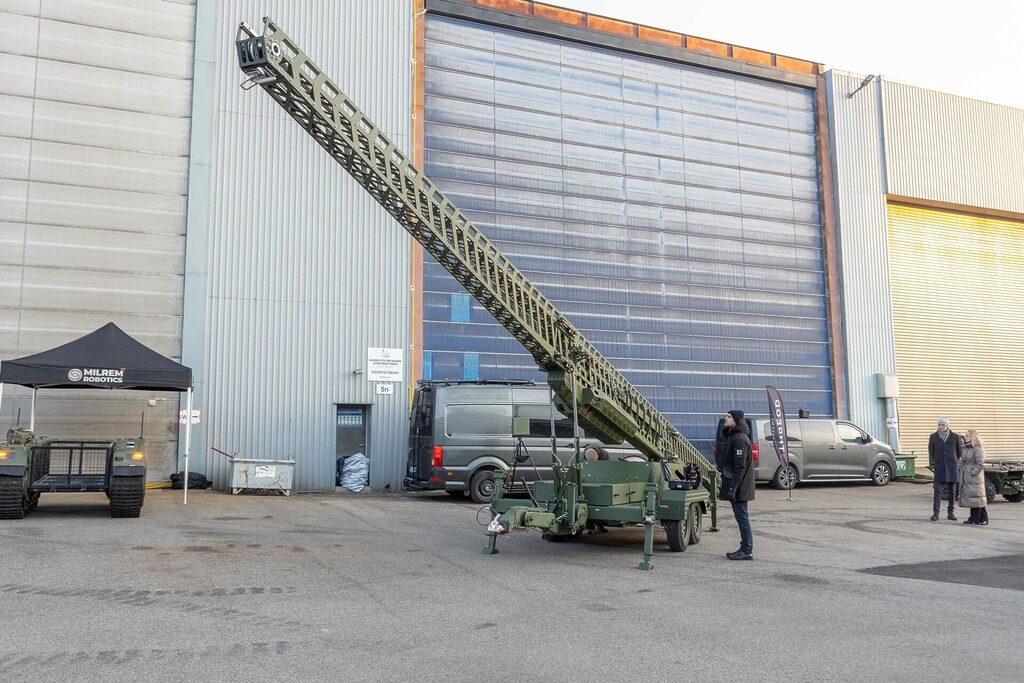
Estonian Defence Week will begin with a day dedicated to startups in the security and defence sector, organized by the Tehnopol Startup Incubator’s NATO DIANA Estonian accelerator (Defence Innovation Accelerator for the North Atlantic).
The programme will also feature the annual Baltic Defence Conference ABCD (23–24 September), where over two days politicians, military officials, academics, analysts, and media representatives will discuss NATO and EU defence issues.
The week’s central events will include the Estonian Defence Industry Symposium “The Power of Disruption” (25 September) and “Tallinn Defence EXPO” (24–25 September) at Kultuurikatel, featuring presentations, panel discussions, and working groups on military technologies.
The Defence Week will conclude with a demo day for specialists in Tartu (26 September), showcasing various defence sector technologies.
A more detailed event overview is available here.
Founded in February 2009, the Estonian Defence and Aerospace Industry Association (EKTL) currently brings together over 150 companies covering all key defence industry sectors. The association aims to create better opportunities for its member companies in developing and marketing defence technologies and to serve as a strategic partner to the Estonian state in strengthening national defence as well as contributing to economic growth.
Photos by Kaarel Tigas from the Estonian defence industry demo day held for foreign journalists during the Joint Expeditionary Force Summit in Tallinn in December last year.
Gridraven, a participant in the ESA BIC accelerator, raises €4 million from investors and enters the US market
Gridraven, whose AI-driven Dynamic Line Rating technology addresses grid bottlenecks and unlocks up to 30% more grid capacity annually, proudly announces its official expansion into the United States with the registration of Gridraven Inc. This strategic move underscores the company’s commitment to scaling operations and serving a growing international clientele.
As part of this expansion, Gridraven’s CEO, Georg Rute, is preparing to relocate to Austin, Texas, to spearhead the company’s US operations in one of the world’s most dynamic energy markets.
”The US and especially Texas are seeing significant load growth from electrification and data centres. More grid capacity is needed on day-ahead energy markets to power this growth. Our software solution boosts grid capacity with zero additional hardware, helping utilities service this load growth. We’re setting up in Austin, Texas, to be close to our customers,” comments Georg Rute.
To fuel its international expansion, Gridraven has raised €4 million in funding from leading European venture capital firms, including 42CAP (Germany) and Icebreaker.vc (Finland). The funding will be directed toward scaling operations, growing the team, and accelerating the rollout of innovative solutions designed to address the evolving challenges of the global energy sector.
Alex Meyer, 42CAP: “We are very impressed with Gridraven’s team and technology. Their core innovation of applying AI and machine learning to increase the resolution of weather forecasts is the missing link for unlocking more capacity from the existing grids. We see enormous potential for the solution across the world and believe the team is right for bringing it to market.”
Aleksi Partanen, Icebreaker.vc adds: “Having supported the founding team from the idea stage since late 2023, we have witnessed their ability to build world-class technology. We will continue to support Gridraven throughout their progress.”
Gridraven’s system optimizes transmission lines by leveraging machine learning-based weather models, allowing grids to carry more power during favorable conditions. Their technology can unlock more capacity for grid operators today without the need for any new hardware. The solution can be viewed on claw.gridraven.com.
Overview of results
Gridraven has locked in its first successful results with Estonian energy provider Elering. The results are based on tests conducted on a 110 kV line, where forecasts were validated against eight measurement points up to 48 hours ahead. The trials occurred in a forested area where current wind forecasts had previously failed to provide reliable results.
Gridraven’s solution demonstrated significant success:
- Average Forecast Accuracy: 60% better than existing forecasts.
- Reliability: The 95% confidence interval was maintained 95.1% of the time.
- Capacity Increase: From September to November 2024, Gridraven’s forecasted line capacity was a third higher than the capacity achieved with the previously used approach while ensuring that confidence intervals for constantly changing variables were met.
About Gridraven
Founded to address critical bottlenecks in power grids, Gridraven is a fast-growing tech company focused on delivering intelligent AI solutions that maximize grid capacity. With its newly established presence in the US, and a strong team of experts driving energy innovation, Gridraven is poised to lead the energy industry into a more efficient future.
Gridraven is participating in the European Space Agency’s Estonian Business Incubation Centre (ESA BIC), where Tehnopol is one of the partners. The incubator aims to help Estonian startups enter international markets by providing €60,000 in seed funding along with sector-specific mentoring for product or service development.
If you have an innovative idea for using space technologies or are developing applications for new products and services in non-space environments, you are welcome to apply to the incubator. Learn more and submit your application here!
Prototron spring round open for applicants – €75,000 to be distributed
Prototron Fund, Estonia’s first fund dedicated to financing prototype development, has launched a new competition aimed at finding companies eager to transform their ideas into practical solutions. A total of €75,000 will be distributed among the best applicants, with applications open until 28 February.
Prototyping is one of the first and most crucial steps for a company, as it provides valuable feedback on whether the developed product is needed and can serve as the foundation for building a business. ‘Prototyping is one of the riskiest investments a company can make, but it is essential for determining whether a product has any potential. With Prototron’s support, companies can develop their first prototype and take their first steps in the business world,’ said Brait Pilvik, CEO of Prototron.
To apply, the startup must have a (technologically) innovative idea, the prototype must have market and international growth potential, the company must have a well-thought-out business model and a strong team ready to execute it. If all these criteria are met, there is a good chance of receiving funding to bring the idea to life.
‘While determination and a hard-working team are crucial to starting a business, it is very difficult to test many ideas without funding. Over the years, Prototron has supported 106 teams in building their first prototypes, distributing a total of €1,428,000. Additionally, they have raised more than €85,000,000. I am excited to see which success story we can contribute to in this spring round,’ said Triin Preem, Startup Segment Manager at Swedbank.
Last year, a total of 400 applications were received across two rounds, with 20 startups advancing to the final. In each round, four companies received funding: ILUS Bike, Sciflux, Audiocat, and TraynMe in the spring, and Expand, Laflow, MastSmart, and ChargeIQ in the autumn. Previously, the Prototron Fund has helped bring to life ideas that have evolved into internationally recognised companies, including UP Catalyst, Lingvist, Bikeep, Fusebox and many others.
According to Caroline Aruoja, Startup Manager at TalTech, many teams from the university are expected to join Prototron in the coming years. ‘In recent months, student activity in launching businesses and supporting fellow entrepreneurs has noticeably increased. Last year, driven by TalTech programmes, students founded more than twice as many companies as in previous years and a new student entrepreneurship organisation Startup Garage was launched. Students have even taken the lead in running IGNITER, a free business idea development programme for fellow students and high schoolers. We can surely expect many competitive teams from the university to apply to Prototron in the coming years,’ noted Aruoja.
Startups that have completed Prototron have the opportunity to continue their entrepreneurial journey at Tehnopol Startup Incubator.
Applications can be submitted by 28 February at www.prototron.ee.
The Prototron Fund was established by Swedbank, TalTech and the Tehnopol Science and Business Park to develop and fund the creation of prototypes for technological ideas. Over the past decade, Prototron has funded 106 projects with approximately €1.4 million and the teams have subsequently raised more than €85 million in follow-up investments.
Inspiring speakers and AI at our booth – Tehnopol’s recap of sTARTUp Day
The end of January was once again spent at the sTARTUp Day business festival in Tartu. Tehnopol was involved in organizing pre-events, we had a booth in the demo area, and supported startups from our programs on stage.
On the pre-events day, January 29, we hosted a closed Zebra ScaleUp Bootcamp pitch event. Additionally, we contributed to a health tech seminar that brought together entrepreneurs and researchers.
On the main conference day, the Startup Incubator demo day took place, where startups such as Eetos, Wayren, GaltTec, Kindel.AI, GaasAI, TeleArmy, TraynMe, VisioTag, and Bebo presented their ventures on stage.
Wayren’s co-founder and CEO, Henry Härm, shared their experiences in various acceleration programs on the main stage. Wayren has gone through Prototron and the Startup Incubator and is now part of NATO DIANA’s accelerator in Estonia. We also had a chat with Henry – you can read the interview here and on the sTARTUp Day blog.
As always, our booth had a little surprise for visitors – this time, they could take AI-enhanced photos of themselves. A big shoutout to the Estonian company PortrAI, the first photo booth in Estonia to incorporate artificial intelligence.
We also attended various talks, and here are just a few key takeaways we brought back from Tartu:
- Triin Agan (Eesti Loto) shared how the startup sector has influenced her mindset and how her leadership style has shaken up a traditional company like Eesti Loto. She is implementing a data-driven management approach.
- Veiko-Vello Palm (Frankenburg Technologies) spoke about his transition from the Estonian Defence Forces to the startup sector. He emphasized the importance of having a clear mission statement – while having it doesn’t guarantee success, its absence can lead to failure. A well-defined vision also helps to attract talent.
- Tim Vaino (FFF) advised startup founders to be curious, do their research, and clarify their goals and ambitions. He also encouraged investors to be kind to startup entrepreneurs.
- The most vibrant speaker at sTARTUp Day was undoubtedly Nordika, who shared valuable advice with startup founders. Among other things, she reminded the audience not to fear dreaming big – dreams do come true sometimes – and not to take themselves too seriously. Simple, yet essential advice for the startup sector.
We also received many compliments on our branded outfits – our new kimonos. Here’s the story: the kimonos were made from old Tehnopol-branded hoodies. We collected hoodies from colleagues who were willing to donate them, and with the help of Liina Kaidme, who designed and sewed them, we created unique short kimonos for women and repurposed hoodies for men. Check out the photos for style inspiration!
A big thank you to everyone who visited our booth! In addition to attending major business festivals throughout the year, we also organize many events of our own, where everyone is welcome. You can find an overview of upcoming events here!
Here’s a small selection of photos from the official sTARTUp Day galleries (photos by Kiur Kaasik, Mailis Vahenurm, Reigo Teervalt).
